#and no. i still cannot draw without a reference
Explore tagged Tumblr posts
Note
Ooh "Akechi knew Joker was a PT at rank 3 and I have the evidence to back it up??" Would you be willing to prove your justice I mean assertion that Akechi knows who Joker is
yeah, so, before we get started i wanna make clear: nothing i have is a slam-dunk absolute proof that cannot be argued with. but i think there is a solid case to be made that akechi strongly suspected joker was a phantom thief before they even met at the tv station. and that, in fact, joker being called on during the show was an orchestrated attempt on goro's part to both get a reading on him as a potential phantom thief and establish a connection in order to get close to him as a prime suspect.
alright, so first of all, what does akechi know before june? well, we know he was in madarame's palace around the same time the phantom thieves were.

madarame mentions "the one with the black mask" almost as if he expects the black mask to be a part of the group. he's referred to as "the other one" and when madarame mentions him, he first looks across everyone in the group like he expects to find him among them. like i said, this isn't a slam-dunk case or anything, there are alternative explanations. but i don't think it's unreasonable to infer that madarame assumed the black mask was one of them--perhaps because he was trailing them throughout the palace.
we don't know why akechi might have paid a visit to madarame. maybe he was there for unrelated reasons to the phantom thieves--we know madarame had connections to shido. madarame also appears to believe in this same conversation that the thieves are here to kill him, so maybe he was here to make some threats and instill fear in madarame's subconscious. but regardless, we have good reason to think that akechi saw the phantom thieves inside madarame's palace. if he saw them, then that means he would have a general idea of their appearances, even if they are wearing those masks.
okay, so there's that. but i have some other evidence as well. in particular, a scene that was added to royal--and the extended version that was cut.
youtube
the scene that made it into royal cut off before sae and akechi could talk, but they still included the rest of it, meaning sae and akechi still walk past right after ryuji is loudly proclaiming their intentions to steal kamoshida's heart.
i would speculate that they ended up cutting this because it doesn't make much sense why this would mean anything to akechi. there's been no public change of heart yet, and there's no reason for a random conversation like this to catch his attention when akechi doesn't know what's going on at shujin and he isn't prescient, he doesn't have kamoshida's change of heart to give this conversation context. that said, the fact they wrote this scene at all shows they wanted to include something that hinted at the idea that akechi knows what's going on and has reasons to suspect them from very early on.
(personally, i don't think it's unreasonable for akechi to retroactively recall the loud blonde boy yelling on the street about taking kamoshida down after he's had his change of heart. and when he sees that same blonde boy in the metaverse and hanging around akira at the tv station later, well, the connections draw themselves...)
but okay, so far i've just been pointing at scenes that might loosely imply akechi has information that would lead him to suspect akira, but nothing concrete. but here is where we get concrete confirmation that akechi knows/suspects the phantom thieves, and it's this scene with the siu director that triggers after the phantom thieves change kaneshiro's heart.

right here the siu director is talking to the principal of shujin and pressing for information on suspects. in the conversation, he says that their other operative gave them a list of suspects "without delay." this other operative is akechi. his list of suspects, by this point, would almost certainly be akira kurusu and his friends. they're the most obvious suspects, which brings me to my other point--
suspecting joker as being a phantom thief is an extremely obvious inference. akechi is supposed to be intelligent, and there really isn't another suspect that would fit better than him. he transferred into shujin immediately before the first incident, has a criminal record, and is constantly seen with both kamoshida's and madarame's biggest victims. it would not be difficult to pin him down before the kaneshiro incident at all.
but back to the siu director--notice that he says "without delay." we know for a fact that akechi has given his suspect list by the time of kaneshiro's change of heart, but it's likely that his list predated this conversation by quite a bit. akechi could have given his suspect list any time before the end of june. personally, i think it's likely he submitted a suspect list shortly after madarame's change of heart, around the time of his and akira's first meeting.
but on the note of akechi's rank 3, even if you don't think akechi suspected who akira was before they met like i do, the scene with the siu director is proof he knows before rank 3. there is no hard date for either the siu director's scene (which is triggered on the date you change kaneshiro's heart) or akechi's rank 3 (which can be triggered at any time depending on how quickly you go through his ranks). but the earliest akechi's rank 3 can take place is around the end of june, the same rough time as the siu director scene--meaning that he's submitted his suspect list by then. so he absolutely suspects who akira is by rank 3.
okay, so there's my case. i'll end this by saying that the ultimate reason i think akechi already suspected who akira was when they met is because i think it makes narrative sense and is just extremely fun for their dynamic. both akechi and akira (because of the pancakes slip-up) thinking they have the other figured out, while also believing they have the other completely fooled, is extremely entertaining. i have to imagine that every single conversation these boys have is a game they're playing where they're trying to get the other to slip up while also not revealing who they really are.
so, yeah. i believe that when akechi met the phantom thieves on 6/9, he already suspected them as being as such. and so the next day he orchestrated it so the boy he suspected as being their leader would be called on, so he could sus out his reaction to the phantom thieves while being broadcasted on live tv, and so he could use that interaction to corner him afterwards and befriend him in order to pin down his already existing suspicions. i think it was a game for both of them from the very start.
(and if you're wondering why the shido conspiracy waited so long to do anything if they knew who the phantom thieves were from the start, it's because they're playing the long game. they need to let the phantom thieves rise to stardom before they could orchestrate their downfall. the phantom thieves are extremely lucky the shido conspiracy decided to play the long game, because otherwise they would have been so fucked so quickly. they are not doing a good job of laying low or keeping their identities secret. at all.)
#sera answers#anon#sera metas#goro akechi#akeshu#p5#i hadnt really pinned this down before writing out this meta but i think the moment akechi begins to suspect akira#might be the same moment akira begins to suspect him. aka that day of their first meeting on 6/9.#akechi sees this loud blonde boy he vaguely recognizes from both the interaction on the street and the metaverse#standing next to this quiet boy who looks uncannily similar to the boy who was leading the group in madarame's palace#he does research into these shujin kids that night and realizes who akira is and how many signs point to him being the leader of the pt#and the rest is history#meanwhile akira also thinks akechi is the black mask from this moment forward#and is similarly watching a million detective prince videos that night while akechi looks into him#theyre so down bad for each other#rivals at first sight
36 notes
·
View notes
Text

bit of fanart based on my current fic
#dw fanart#doctor who#martha jones#tenmartha#she's in her 1969 shopgirl outfit#and he's given her his jacket#if you're wondering what the hell she's wearing#i wanted her hair to be curlier but the tremor in my hand had other ideas#and no. i still cannot draw without a reference#this is her exact expression from last of the time lords#i spent way too long on this#great distraction from the most recent dw episode though#i never post here and i really need to start#back to working on the next 2 chapters now
51 notes
·
View notes
Text

theyre soft your honour
#my art#jujutsu kaisen#jjk#okkotsu yuuta#inumaki toge#inuokko#inumaki#yuuta#fanart#jjk fanart#timelapse#long time no canon fits !!!#still having the time of my life playing with these brushes#i was just gna do a regular draws to slap on the ask i just got but i decided 2 record it last minute fgdgd#didnt know if an mp4 file would cooperate if i tried to put it under an ask so i played it safe#but know this is fr u anon <3#i ..... cannot believe i am continuing my streak from last night of Forgetting very key and very obvious design elements#last night it was yuuij's sukuna scars.... today it is inumaki's tattoos.......#smh im Slipping fr#breaking news tumblr user hinamie fake jjk fan And fake fanartist :C#its ok tho ! crisis averted!! me forgetting them may be caught in 4k but i Did catch myself before posting th video#that would have been tragic i would have been chased out of this fandom with pitchforks. i wld have been pelted with rocks#anyway i like this piece a lot i like them i like the black/white/blue#VERY happy i got yuuta's hair right without too much hassel#turns out i know how to draw and references r a godsend <3#oh also !!! @ the person who asked about my colouring process this is what i was talking abt re: painting with an underpaint layer#helps everything look cohesive :3
2K notes
·
View notes
Text


these sketches are all inspired by @miribalis fanfiction "Managerial Liberties" where Adam stays at the hotel (spoiler - he is not happy and he is still stupid) [and please everyone who sees this post also has to read "Bedtime Rituals to Try out Before the Next Angelic War" so we can scream in each other's faces how INSANELY good both fanfictions are]
#hazbin hotel fanart#hazbin hotel adam#hazbin hotel sketch#hazbin hotel#hazbin hotel lucifer#hazbin hotel alastor#hazbin hotel niffty#i think i broke every bone in my body trying to come up with a design for adam without his mask#there are not enough references#dont question his horns (which look different in the fanfiction btw but im too stupid and tired)#the positioning is QUESTIONABLE#the sketches of him and niffty are just my thoughts what might happen in the next chapter#will they give him a suit? or will they force him to wear an even bigger potato sack?#my theory is that they just hate him because they all have to be furries and he still is just some random white guy#the JOY I FELT WHEN I SAW THAT BUDINCA POSTED A NEW HAZBIN FANFICTION ON AO3#cannot be explained#i want to draw something for bedtime rituals so badly#my art
208 notes
·
View notes
Text

Using this post as reference.
Apparently, I get really motivated when @geniemillies yells at me. First time coloring and shading 🫡 I will try a different style for the bottom one.
#i still cannot draw without reference so#maybe if i keep doing this i will get good just like chests#i do chest v well#superman#clark kent#christopher reeve#superman 78
26 notes
·
View notes
Text

so, i have a new movie/fictional guy to obsess over - in my defense, my friend dragged me into this fandom
#my art#art#finished art#fanart#traditional drawing#traditional sketch#traditional art#dps#dead poets society#dps fanart#dead poets society fanart#steven meeks#stephen meeks#steven meeks fanart#stephen meeks fanart#meeks#dps meeks#*looks at the guys from my class* steven meeks would never act like that#tfw you love a character so much but you suck at drawing them 💔#i cannot for the love of god get meeks' eyes right no matter how hard i try. im a failure of an artist#still doesnt stop from trying my best - ill continue practicing (digitally) over the weekend but no promises#i tried to draw the study group + radio making scene without a reference in class... always use a reference kids dont be stubborn like me#anyway#enjoy the burnt food#<3
40 notes
·
View notes
Note
what’s your favourite thing to draw
I LOVE DRAWING HANDS !!!
unpopular i know but i love the shapes and the curves i feel like most of my art is pretty angular and has sharp edges so i love mixing that in with how hands look :D
#all the hands i draw are references btw. mostly from pics i took myself other times from other art and refs it depends#i cannot draw a hand without reference 😭😭#ask koko#but it’s still fun
25 notes
·
View notes
Text
Phoenix Wright my best friend Phoenix Wright....
#im getting dragged back into that hyperfixation#i need to draw him again#been a while#saw a post the other day from like. years ago#that talked about referring to his and kristoph's relationship like dancing and aough#like. think about it#having to go through such an intimate activity such as dancing. keeping the other as close and invested as possible#without revealing too much or failing and letting him take the upper hand#like. im imagining PW allowing kris to have the lead. but hes normally the lead generally. so just thinly veiled following#getting the steps perfectly while still preventing himself from accidently taking the lead and revealing too much#i know thats not how dancing works that you cant really accidently take the lead#but you know what i mean#metaphors metaphors#dancing is an act of trust. following someones lead is an act of trust. you must follow the lead of one you cannot trust#do you understand me do you see my vision
2 notes
·
View notes
Text

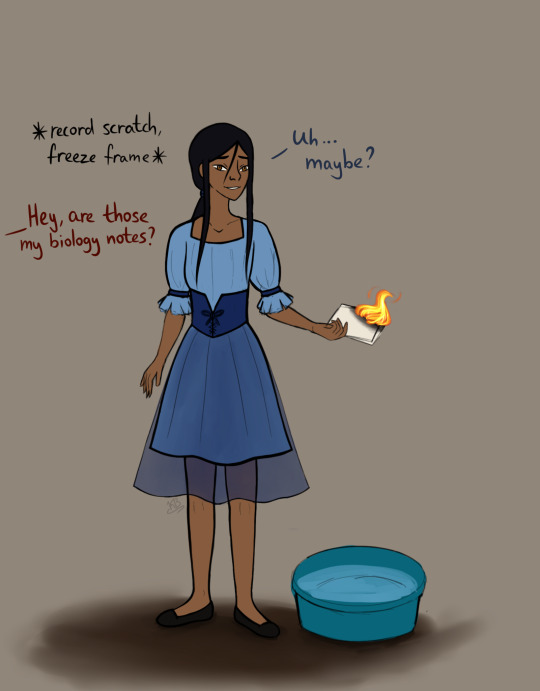
In @rokurookajima’s Metalbanders AU, Suiren and Vaatu often study together at Suiren’s place after school. The effectiveness of said studying is… questionable
#my art#artists on tumblr#the legend of korra#Kat and Nia and their multiverse of madness#metalbanders#🗑️🔥#vaatu#original character#sotrl suiren#a.k.a it somehow came to be that these two listen to Hamilton together#and I was gonna say it was Syd’s idea but then remembered it was mine so…#but HEY she agrees with me on all counts so who cares#anyway#very often their study/homework sessions ends up getting derailed because someone will make a reference#and suddenly they’re putting on a two person show#Suiren is a method actor so no she cannot sing Burn without setting something on fire#unfortunately Vaatu’s notes happened to be the perfect replacement for Alexander’s letters. RIP#(she can do it without being cheated on or having ever dated anyone though. curious)#they’re actually rather good. at least Suiren is. but their show still has an audience of one (1): Suiren’s cat#her sister shares a room with her but she long since learned to not be home when Vaatu comes over#because these two are unbearable when they’re together#they either fight and insult each other. or do this#and Midori very much wants nothing to do with it#she’d much rather go play Mario kart with Bolin or hang out with Opal or something#why does her big sister have to be so damn embarrassing 🙄🙄🙄#moving on. hi Syd <3 I did say I’d draw something for you. didn’t I?#hope you like this haha#can’t believe I’m making Hamilton references in the year of our lord and saviour 2025 but here we are#this is by far the funniest idea we’ve come up with for the two of them#either the founding fathers existed or LMM made it all up… second option is funnier IMO. and ffs I’ve reached the tag limit again
3 notes
·
View notes
Text
Idk who needs to hear it but if you have Aphantasia you can absolutely do character art. Don't let it discourage you. Especially since a good portion of art advice won't fit you and will leave you feeling like its your fault.
I have Aphantasia, its super hard to put characters in poses from my mind. I cannot draw cartoons or exaggeration well, its very hard because I do not see the drawing until it is on the page. I use so many construction lines and blocks of color and always need a reference to base my character poses on. I cannot imagine things artistically before they're on the page and it is super frustrating.
You can still do it with Aphantasia though, it just takes practice. So many of your sketches without references are going to look awful despite you knowing the proper proportions of the human body, it doesn't mean you don't know what you're doing.
It just means you need to give yourself extra help. You're not lesser or bad for not being able to draw on a whim or not having these intricate details. Trust me, I've struggled with thinking that.
The best thing you can do to work with it is collect so many references, use a pose software (like magic poser), and absolutely screenshot and collect art that has a creative element you struggle with. (For me its color, backgrounds, and splash text.) Also, maybe practice abstract art. You have a brain unhindered by a visual expectation, I recommend it. For me I like to do surrealist/abstract pictures of water and space. It takes technical skill but everyday is a good day to start practicing.
Having Aphantasia is a neutral thing. It's not bad or good, it's just there. That bad part is not acknowledging that you work differently so you need to adapt differently.
6K notes
·
View notes
Note
hey @pukicho i saw your art and i thought it was super cool! you improved so quickly (really impressive btw), and i was wondering what resources used to study art? and what app/website you digitally draw on? and your brushes if your okay with sharing them? and literally ANY other information you had because i would love to learn how to draw?
i feel like a victorian street rat asking for more bread
I use an XP-Pen Pen Tablet and Clip Studio Paint as my program of choice, but any pencil and notebook will suffice for learning, and may even be better. As for learning, I use books, baby!!! BOOKS! I'll even be nice and tell u which ones, because I am a lover of shared knowledge:
How To Draw by Scott Robtertson - deceptively complex book on perspective. It tells you how to draw a box, I then suggest you draw a fuck-load of boxes in correct perspective before moving forward. Having a strong grasp on planes and perspective allows you to properly grasp the volumes and shape of almost anything. It's the baseline principle to visualizing what u wanna draw. Without simple forms understood in perspective, you merely lack the skills necessary to draw from imagination.
Carlson's guide to landscape Painting - A good book, even if u don't intend to draw landscapes. Tons of clever explanations on lighting and value. Tons of useful relational shortcuts to understand complex scenery in smarter ways. I like the way he explains things, it makes me go ohhhh.
TACO point character drawing 1 & 2 - Two NEAT anatomy reference books. It's mostly just a collection of simplified, anime-esque proportional figure drawings. They're a great reference, but I absolutely wouldn't use it as my only set of books on anatomy. It's still useful to use and learn, but in a more general way - and I can't currently apply everything the book tells me yet, because I haven't learned the forms in more detail first.
The Human Figure by Jon H Vanderpoel - this is a short, but VERY useful anatomy reference book. The Author is from the early 1900s - real oldschool, which is good. He has a very useful, matter-of-fact writing style. This is the better starter book to use in order to remember the proportional relationships of the human body (even then, it's still not enough)
The Practice of Oil Painting & Drawing by Solomon J. Solomon - I'll be honest, this one makes sense to me conceptually, but I cannot fucking execute some of his practices. This dude is from the victorian era, his paintings are in museums and they're too good. It only makes sense that his views and approach to art are headier than some of the other suggestions on this list. The book is still useful, and I presume will only grow in usefulness as I learn. It does still have some cool ideas in the first-half of the book that you can easily apply to your art studies! But the second half is a series of master-derived schools of learning that I have yet to dare touch.
(also check out loomis books. I hear they are good)
ENJOY
1K notes
·
View notes
Text

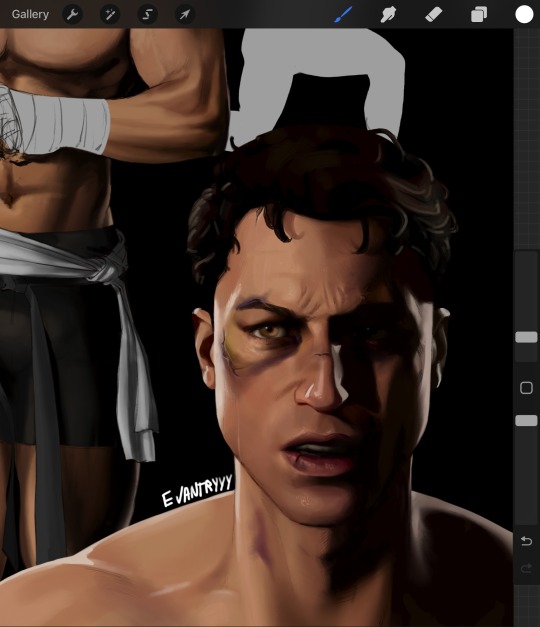
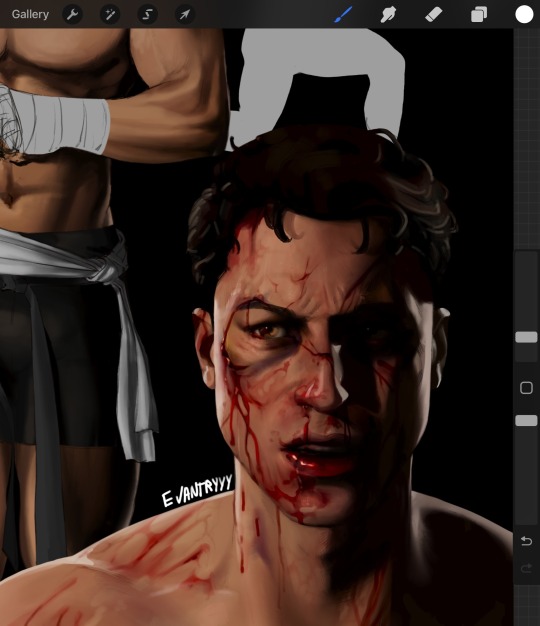
Gosh it’s huge shame that I cannot seem to finish this drawing I’ve been working on for months all because I cannot figure out how LIGHTING WORKS ON THE BODY (cropped body to the left and above head) … Anyway, here’s the only “completed” portion of the drawing… Yeah it’s Johnny Cage, hope it still looks like him.
DONT COME AT ME WITH ANATOMY, life’s hard without references. I’ll do more studies for sure
Also college has been slowing down my art motivation 😭 I’ll try my best to draw random doodles of the characters I love! Who would you guys like to see though?
#fan art#illustration#mk1#johnny cage#mortal kombat#johnny cage fanart#mk1 johnny cage#mortality#cw: gore#tw wounds#my wips#art wip#fanart
1K notes
·
View notes
Text
ORORUN REDRAW GUIDE !
i think we’ve all seen the atrocity that is genshin’s unreleased character, ororun. the entirety of natlan is a mess really, but as a yoruba person myself i CANNOT keep quiet about ororun specifically.
outside yoruba mythology, in yoruba, ‘Olorun’ (the name ororun is based on, pronounced o-law-roon , with o pronounced as in orange and the ‘roon’ pronounced shortly, not dragged on at all) is actually the same word we often use to refer to God in Christianity. Christianity is the primary religion among us yorubas so honestly, i was kinda glad they misspelled his name. it would feel SO disrespectful referring to whatever that thing is with the same word we use to refer to God who we actually worship. religion aside, genshin’s depiction of Olorun (cultural god, not Christian one) is downright disgusting. i’d never paid too much attention to genshin and its poor representation, but now that my culture has fallen victim to it, i completely understand all the outrage.
edit: please note that while we use ‘Olorun’ to refer to the Christian God, Olorun is just a general word for ‘god’ itself ! for example if i say “God in heaven” and “god of thunder” we know i’m referring to two different beings, in yoruba it’s the kind of the same—the same word is used to refer to both the Christian and other gods, but we know it’s different, even though olorun can be capitalized regardless of what god we’re talking about (unlike english where the Christian God is capitalized and other gods aren’t) at the end of the day though, when we say “olorun” even without context, we are usually referring to the christian God !
1. PLEASE DO NOT DRAW HIM WITH ANIMAL EARS !
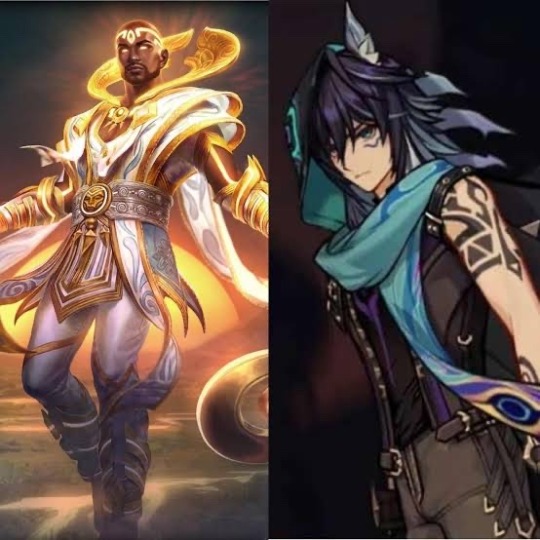
i’ve noticed that hoyoverse has this nasty habit of portraying every dark skinned character as wild or animal-esque. kaeya seems to be the only exception to this. even xinyan, though lacking any animal features, has this wild energy to her. some might call it a stretch, but i feel like her features are pretty feline in comparison to other liyue characters.
Olorun in our culture is the supreme god of the heavens. In my opinion, it is disrespectful to liken him to something akin to an animal. normally i wouldn’t even mind that much, but with how hoyo makes its few dark characters more and more like animals, i can’t help but feel weird about it. its really off putting.
2. HIS HAIR WOULD NOT BE CURLY !
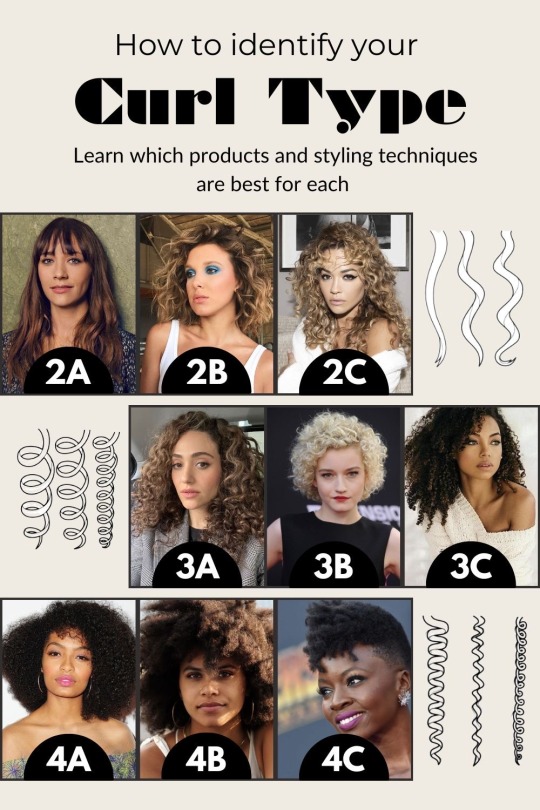
majority of nigerians have 4C HAIR. not wavy hair or loose curls. some have 4B, but 4C is the usual here, that is, kinky or coily hair. Olorun is often portrayed as bald in traditional art, but trust me if he had hair his hair would resemble his people’s, not Tyla’s.
DREADLOCKS ARE A YES ! outside nigeria, locking hair is pretty common, but in nigeria a lot of people have locks naturally. our hair sometimes just grows out that way, no treatment no nothing. dreads are 100% an appropriate style, they look good asf too.
3. PLEASE USE CULTURAL FABRICS IN YOUR DESIGNS !
when i saw ororun’s outfit, i almost started crying. they couldn’t even bother to dress him up a little. they really dressed my brother in a scarf and cape and called it a day 😭 upon how fashionable we nigerians are know to be, hoyoverse still made it their mission to embarrass us stylistically. God knows my people have suffered man 😭
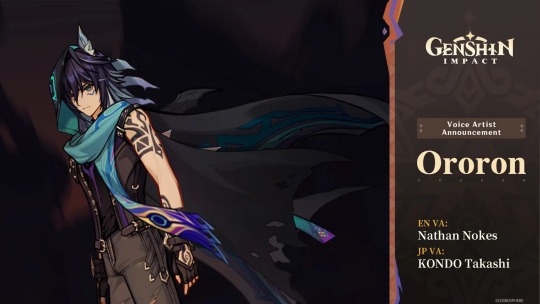
ankara is a traditional nigerian fabric that features bright colors and lots of patterned designs. see below:
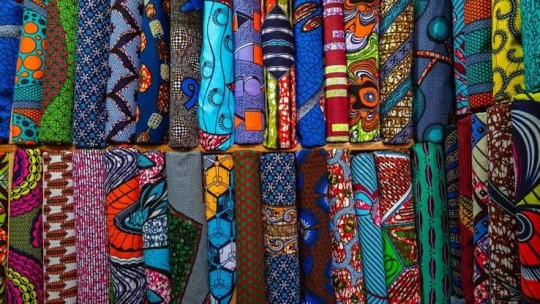
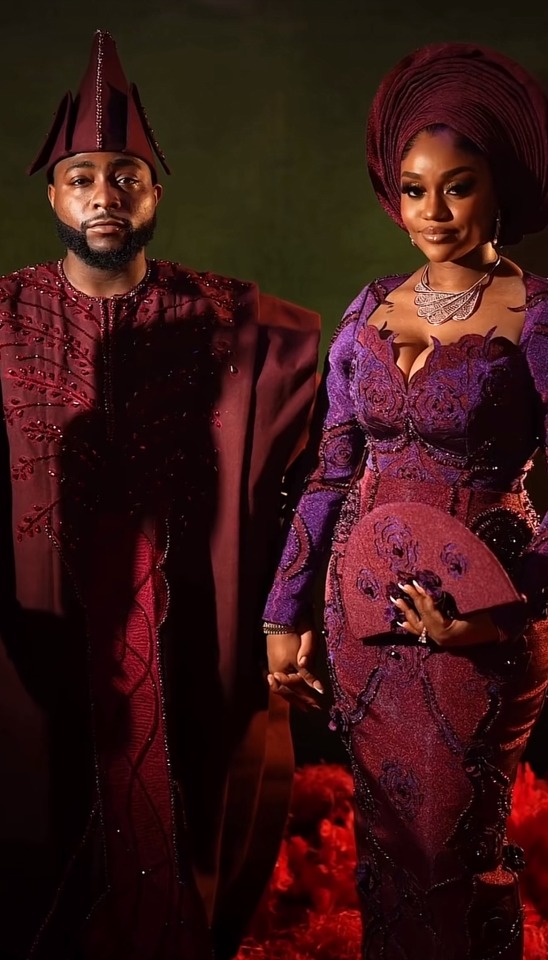
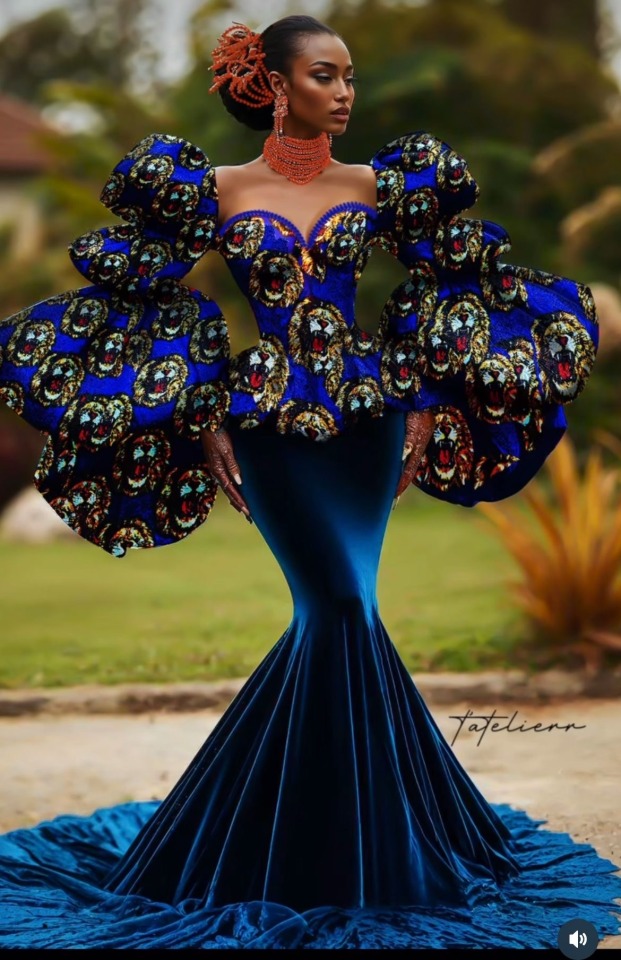
here in 9ja, we love our ankara. it’s a big part of our fashion here and trust me it would look excellent in your designs. it’s perfectly fine to draw ororun in normal fabrics since he’s a deity and it’s not like ankara existed back then, but if you really want to represent nigeria, ankara is a must 🙏
i’m going to address another fashion piece because if you search up nigerian fashion you’ll see it a lot: beads.
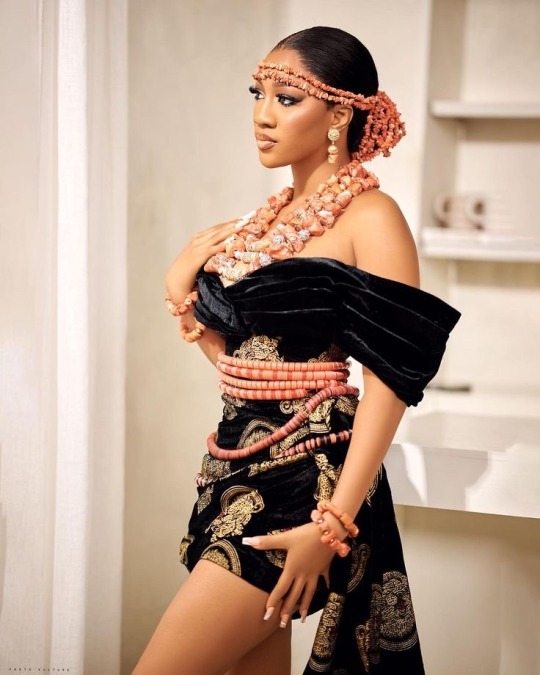
these orange beads are igbo (another tribe here in nigeria) NOT yoruba. does this mean you can’t use it in olorun’s design ? no ! let me explain. tbh, here in nigeria there’s a bit of...tension between clans. it’s not that common, but older people are definitely a lot more tribalist. as a yoruba i love my igbo brothers and sisters, i truly believe they’re the most fashionable clan and i adore their festivities, they always go over the top. please, just look at them:
(only one image because of image caps, ugh)
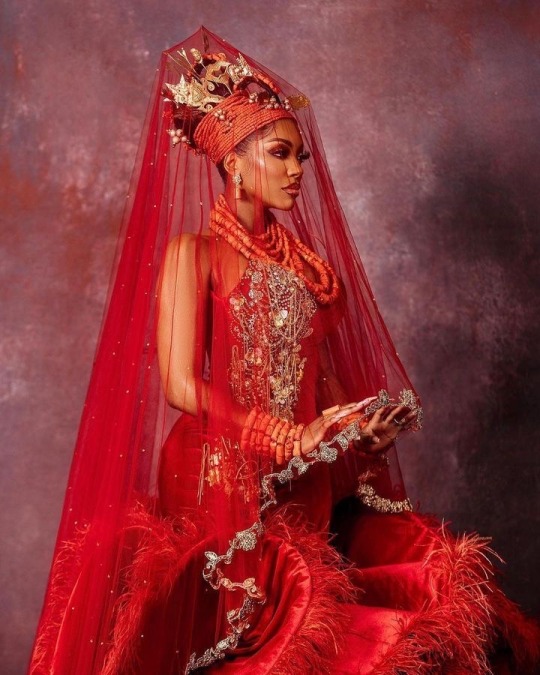
anyway, we yorubas wear beads too. but the specific way the beads are worn around the head and in multiple layers round the neck is igbo, not yoruba. though i personally wouldn’t care too much if i saw olorun with igbo beads since all i want is for him to at least look nigerian, at the end of the day he is a yoruba deity. it might be disrespectful to dress the god of one clan as if he belongs to another, especially since there is so much historical ( and very slight but uncommon present ) day tension between both clans.
here’s a more yoruba outfit. sorry yall, it might be hard for you to distinguish if you’re not yoruba or igbo, but a lot of nigerians can tell the difference at a glance. ( actually nowadays, there is so much overlap between yoruba and igbo fashion, but there are many specific styles that may be associated with one tribe and not the other, for example how beads are worn in the above paragraph ) please do your research, he’s not only a nigerian god, but a yoruba one.
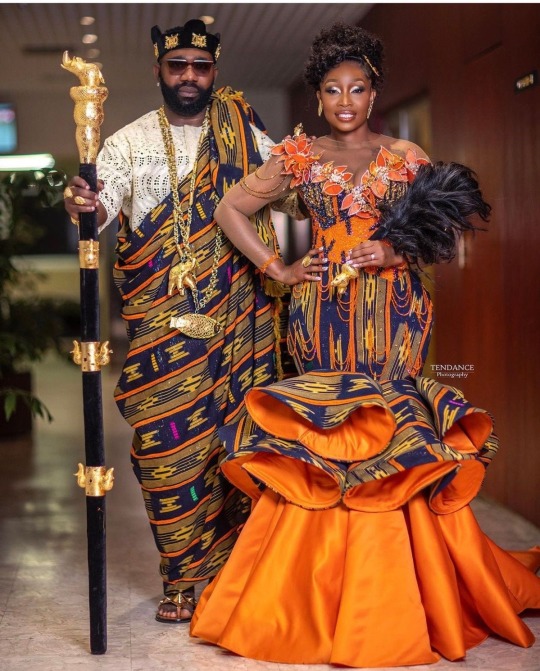
one more thing, because i know it will start discourse : skin tone.
nigerians have a very diverse range of skin tones. some of us are so pale, if not for our afrocentric features we could maybe pass for another race. however, ororun is yoruba.
light skinned nigerians are usually igbo. not to say that yorubas can’t be light skin, but here in nigeria if you saw a light skinned person, we’d automatically assume they were igbo. igbo people usually have lighter skin tones. majority of yorubas fall on the more milk to dark chocolate end of the skin tone spectrum. i’m saying this now because i know a lot of people are going to start arguments over ororun being redrawn as ‘too light’ or ‘too dark.’ i don’t really care about complexion, but i thought i’d help you all get your facts right.
that’s it ! if you read all this i’m super thankful. i don’t usually post about this kind of stuff but i honestly love my country and could go on about it for days. nigeria is such a beautiful place with a diverse range of cultures— from hausas to fulanis to so many more. natlan was supposed to be Africa’s time to shine, as well as latin americans, but hoyoverse said fuck you and your people. they did this to an extent with sumeru but natlan was done straight up dirty—not a single melanated character in sight, and the only one who does have melanin, iansan, looks so desaturated you might as well call her grey. i saw someone on tiktok call mualani a dark skinned character—it was at that point that i knew genshin was done for.
please REBLOG this post so it reaches more people and artists in the fandom !! this is literally the third time i’m making this post because tumblr refuses to show it in the tags for some reason 😭 i encourage other cultures who feel misrepresented to make posts like this too. it’s a perfect opportunity to educate and inform people about the diverse cultures genshin has once again failed to represent properly.
Hoyo has never been one to make customer satisfaction their top priority, but we’ve been able to call them out before and i truly believe we can do it again. Natlan is not poor design choice. it is blatant racism, a nation based on POC ethnicities with not a single colored character insight. Hoyoverse has been able to escape racism accusations for as long as i can remember, but natlan is the icing on the cake. we CANNOT allow hoyo to proceed as planned without giving them the appropriate backlash.
Also, if you redraw ororun using this guide, make sure to tag me here or on my main blog, @heartkaji !! i’d love to see all your redesigns. once again, thank you all for reading and have an amazing day !!
#REBLOG REBLOG REBLOG !#genshin#genshin impact#sumeru genshin#genshin sumeru#genshin natlan#natlan genshin#genshin oc#genshin fanfic#genshin fanart#genshin spoilers#genshin leaks#mihoyo#hoyoverse#genshin ororon#genshin kinich#kinich#mualani#mualani genshin#honkai star rail#honkai fanart#honkai sr#honkai impact 3rd#honkaiedit#hsr#hsr fanart#genshin redesign#sumeru#natlan#( 🛁— !! )
1K notes
·
View notes
Note
Hi. I'm not a canon purist and enjoy some fanon content very much, but I do think people in the fandom should at least familiarize themselves with the canon content and source material. It's easier to break the "rules" so to speak and experiment with canon when you know what that actually is. I've noticed a lot of fans that are only familiar with fanon criticise content that doesn't line up with what they believe to be canon but isn't. The Red Hood for example. I've seen writers who portray him as the violent criminal he is in much of the canon be completely decimated by Jason fans who only know fanon and the retconned version of Red Hood and completely deny canon even exists and refuse to even glance at the comics. Transformative works are important and playing in the sandbox is for everyone but fandom literally cannot exist without canon. Canon is important and people can do whatever they want with it but they should respect it enough to at least look at it.
Hi anon, I'm going to hold your hand as I say this, and I will say it as gently as I can: This is still a form of canon purism.
We can absolutely agree that readers shouldn't berate or abuse writers for how they choose to portray characters in fic, whether that's a more canon-faithful characterization or a popular fanon version. If readers don't like how a character is portrayed, we should encourage them to hit the back button instead.
I want to draw your attention to some of the words you used in your ask above: "should" "respect" "decimated" etc. Those are some strong words to describe how you think people need to behave, in order to exist in fandom. Of course, there is no fandom without canon source material -- I'm not denying that. But with such a wide and varied canon, the DC fandom has examples of the Red Hood you mention above, AND the "retconned" version you also reference. Both are canon, as in actually, officially, canon. WFA is canon, and that Red Hood looks very different from the Red Hood you describe.
Now, I think your issue is that you enjoy a certain version of canon, and you're frustrated that the fandom doesn't also, as trends ebb and flow, enjoy that canon as much as you do. Again, I want to acknowledge that just because a certain version is popular, it doesn't give folks the right to berate authors for writing a different version. But again, I don't think that's what we're really talking about here. From your ask's tone, I think you're suggesting that people should, in order to participate in fandom, read that older canon, that different version, or as you say, "glance at it" before enjoying or writing the fanon version.
Guess what? They actually, really, really, don't have to. It sounds like you have some issues with judging your fellow fandom members who don't read what you do or reference certain canon. But the magic of this fandom is, you can enter it at any point. We're a big pool, and if someone's entry point is the Lego Batman movie and that's it, that's still valid.
Fandom stems from canon, yes, but I almost never hear people talk about movies, or web comics, or other media when they talk about "required reading." It's always a comic. I really wish people would reflect on that before suggesting it as the one true path to being a fan.
The other thing I don't see asks like these reference ever is the reality that sometimes a fandom outstrips its canon material, and that that's an eventuality in some spaces. Fanon interpretations become popular, and people write about those specific characterizations or scenarios. They ebb and flow, like I mentioned, and some are more canon-faithful than others. Some completely reject canon, and again -- it's still fandom. It doesn't make it better or worse than a more canon-faithful fic. It's just different.
I had a couple asks about this topic a few weeks ago, and I'm assuming you haven't read those or you likely wouldn't have sent me this ask. But in them, I discuss how sometimes we need to suck it up and be unhappy that canon-faithful fics aren't as popular in a fandom at a specific time, and stop punishing fellow fans for writing and enjoying those fics. And we really need to stop shitting on them publicly on Tumblr.
Because often, what you're really saying is that you wish more people would write more canon-faithful fics, and stop writing ones about fanon topics you don't enjoy or think are accurate. And to that, I again say, there is nothing you can or should do to change that behavior from others. If you want to read it, write it, enjoy it, etc, do it yourself. Build the comic-faithful community here, write fics and promote challenges, create a discord channel and discuss your "required reading" there.
We are all writing and reading fanfiction at the end of the day. It is a great equalizer in many ways. My silly Lego Batman fic is just as valid as a canon-faithful rewrite of a certain Batman issue. One is not better than the other, or more deserving of respect. You will never get me to admit otherwise on this blog.
tl;dr: people should absolutely not berate authors who choose to write canon-faithful characterizations. however, there are layers of judgement and disdain many DC comics canon-faithful authors/readers have for their fellow fans that I think we need to examine critically in order to coexist respectfully.
289 notes
·
View notes
Text
With Her I Die |12|
Past J.T to Eventual S.S x Female Reader
Chapter Twelve: The Dream Has Gone
warnings: grief/loss (depicted in detail throughout), death (including references to reader's presumed death), child loss/infant death, pregnancy loss/complications, gore/blood (references to bloodstains and implications of violent death), suggestive content, psychological distress/trauma, and supernatural/horror elements.
note(s): them kids can't catch a break.
taglist: @morganismspam23 @slutforabbyanderson
masterlist | previous chapter | next chapter

The world narrows after loss. Contracts around you like skin over a wound, drawing tight and painful, attempting to close what cannot be healed. Shauna feels this contraction—this physical diminishment of what constitutes her universe. The cabin walls press closer. The forest beyond seems more distant, less real. The others move around her like ghosts, their voices muffled, their concerns irrelevant.
She keeps your jacket with her always. Sleeps with it bunched beneath her head, breathes in the diminishing scent of you each morning, traces the bloodstains with her fingertips when she thinks no one is watching. The fabric is wearing thin in places from her constant handling, but she can't bring herself to stop. It's the last tangible piece of you that exists in this world.
"You should eat something," Tai says, offering a bowl of something indistinguishable. Food is food out here, regardless of what it once was.
Shauna turns her face to the wall. "I'm not hungry."
"You need to keep up your strength. Your body is still healing."
"My body is fine." The lie comes easily. Nothing about her is fine—not her body, still tender and aching from birth and loss; not her mind, fractured and unreliable; not her heart, hollowed out and raw. But none of that matters anymore.
Tai sighs, setting the bowl down beside the mattress. "It's there if you change your mind."
She won't. Food tastes like ash now, like grief and emptiness. She eats just enough to keep the others from force-feeding her, just enough to maintain the bare minimum of strength needed to exist. Not to live—she's not doing that anymore—but to persist, to continue taking up space in a world that has taken everything from her.
"For fuck's sake, just leave her alone," she hears Natalie snap at someone later, voice carrying through the cabin walls. "She lost her baby and her—" A pause, a search for the right word. What were you to her, after all? Friend? Lover? Something without a name, something born of shared grief and wilderness logic? "—her person," Natalie finally settles on. "All in the same fucking day. She gets to check out for a while."
Shauna is distantly grateful for the intervention, for being spared another well-meaning intrusion. But mostly she feels nothing at all, floating in the numb space she's cultivated since the burial. Since they brought back your jacket and the unspoken confirmation of your death.
------
Days pass. Maybe weeks. Time loses meaning in the endless cycle of light and dark, of minimal eating and fitful sleeping. Shauna emerges from her cocoon of grief only when absolutely necessary—to relieve herself, to wash perfunctorily in the freezing stream, to fulfill the bare minimum of tasks required to maintain her place in their fragile society.
The others give her space, for the most part. Even Misty, with her hunger for connection and approval, seems to understand that Shauna is beyond the reach of comfort or distraction. They speak to her in soft voices, as if to a wounded animal, their words careful and measured. They never mention the baby—Adam—and they rarely mention you, except in hushed conversations they think she can't hear.
Only Lottie approaches differently, without the tentative pity that colors everyone else's interactions.
"I've been dreaming about her," Lottie says one evening, sitting cross-legged beside Shauna's mattress without invitation. Her eyes are clear today, lucid, though the intensity of her gaze hasn't diminished.
Something stirs in Shauna's chest—the first ripple in the still pond of her grief. "What?"
"Almost every night now," Lottie continues, her voice low, intimate. "She's in the forest, moving through the trees. Sometimes she's running from something. Sometimes she's searching for something. But she's there. I can feel her."
Anger flares, sudden and visceral. "She's dead," Shauna snaps, the words like knives in her throat. "They found her jacket covered in blood. There were... animal tracks." Even now, she can't bring herself to say it more explicitly—can't voice the image that haunts her, of your body being torn apart, consumed, scattered across the forest floor.
"Bodies die," Lottie says with that maddening serenity, that certainty that sets Shauna's teeth on edge. "That doesn't mean she's gone."
"Don't," Shauna warns, her voice trembling with rage. "Don't you dare turn her into one of your fucking forest spirits or whatever the hell you think is out there. She was real. She was a person. She's not just another piece of your bullshit mythology."
Lottie doesn't flinch at the outburst, doesn't retreat. Her dark eyes remain fixed on Shauna's face, patient and knowing in a way that makes Shauna want to scream.
"I'm not trying to take her from you," Lottie says gently. "I'm telling you what I see. What I feel. She's still here, Shauna. Still part of this place."
"Get out," Shauna hisses, her hands clenching into fists. "Get the fuck out before I hurt you."
For a moment, Lottie looks like she might argue, might push harder against the brittle shell of Shauna's composure. But then she nods, rising gracefully to her feet.
"I'll leave food for her," she says, pausing at the doorway. "By the edge of the clearing. Just in case."
"She's dead!" Shauna shouts, loud enough that conversations elsewhere in the cabin abruptly halt. "She's fucking dead, Lottie! Dead people don't eat!"
But Lottie is already gone, slipping out into the fading light, leaving Shauna trembling with rage and something dangerously close to hope.
------
Mari sits by the fire, feeding it small sticks and watching the flames consume them. Her dark hair falls forward, shielding her face from the others, creating a private space for her thoughts. She's thinking about you again—about the first time she saw you, all those years ago when her family moved next door to yours. You were fourteen, gangly and shy, with eyes that seemed to take in everything at once. Mari, twelve and desperate to seem older, had immediately decided to hate you.
It was easier that way, safer than acknowledging the flutter in her chest when you smiled, the way her skin felt too tight whenever you were near. Easier to be mean, to push you away, to establish the comfortable dynamic of antagonism rather than risk the vulnerability of admitting even to herself what she really felt.
And now you're gone, and all those years of carefully constructed defenses mean nothing. Nothing except lost time, lost chances, words unsaid that will remain that way forever.
"Hey," Natalie says, dropping down beside her. "You okay?"
Mari shrugs, not trusting her voice. Natalie is the only one who seems to understand, who doesn't look at her strangely when she gets quiet at the mention of your name. Who doesn't question why she sometimes walks the perimeter of the clearing, scanning the tree line as if expecting to see you emerge from the shadows.
"I was thinking," Natalie says, her voice pitched low enough that only Mari can hear, "of checking out that ravine to the east tomorrow. The one we haven't fully explored yet."
Mari looks up sharply, heart quickening. "For supplies?" she asks, matching Natalie's quiet tone, understanding the need for discretion.
Natalie's eyes meet hers, steady and knowing. "Among other things."
Hope flares in Mari's chest, bright and painful. "I'll come with you."
"It'll be a long walk. Rough terrain."
"I don't care." Mari's voice hardens with determination. "I'm coming."
Natalie studies her for a moment, then nods. "First light, then. Tell the others we're hunting. Better if they don't know what we're really looking for."
Because what they're really looking for is a ghost, a memory, a body that has almost certainly been reduced to bones by now, if that. What they're really looking for is closure that neither of them actually wants, because closure means accepting that you're truly gone, that the forest has claimed you like it has claimed so many others.
"Do you really think there's a chance?" Mari asks, unable to stop herself, needing to hear someone else voice the impossible hope she's been nurturing in secret.
Natalie doesn't answer immediately, her gaze turning to the fire. When she finally speaks, her voice is tight with controlled emotion. "I think that if anyone could survive out there alone, it's her. And I think we owe it to her to make sure, one way or another."
It's not quite hope, not quite faith, but it's enough for Mari. Enough to sustain her through another night, another day in this place that takes and takes and never gives back.
"First light," she agrees, feeding another stick to the hungry flames.
Lottie moves through the forest with practiced ease, her footsteps nearly silent on the soft ground. The small bowl of berries in her hands is more symbolic than practical—a few early seasonal fruits she's gathered, not enough to truly sustain anyone, but a token, an offering. A sign.
She reaches the edge of the clearing, where the safety of their camp gives way to the wilderness beyond. This is where she leaves her offerings—far enough from the cabin that the others won't notice and interfere, close enough that if you were watching, you might see. Might understand the invitation.
Carefully, she sets the bowl on a flat stone, arranging the berries in a pattern that pleases her. Three in the center, forming a triangle, the others circling around them. A small symbol of intent, of welcome, of connection.
"For you," she murmurs, though she doesn't expect a response. Not yet. "If you're hungry. If you're ready."
The dreams have been growing more vivid each night. You moving through the trees, sometimes bloodied, sometimes whole, always searching. Always just beyond reach. Last night, the dream shifted, deepened. You were standing in a stream, naked, washing blood from your skin. The moonlight played across your body, illuminating scars both old and new. When you looked up and saw Lottie watching, you didn't run, didn't hide. You smiled, beckoning her closer with a crook of your finger.
Lottie woke from that dream with her heart racing, her body warm and tense with want. A different kind of hunger than she's used to feeling out here, but hunger nonetheless. The wilderness teaches you to recognize your appetites, to honor them, to understand them as messages from a deeper part of yourself.
"What are you doing?"
The voice startles her. She turns to find Taissa standing a few yards away, arms crossed, expression suspicious. How long has she been watching? Lottie hadn't heard her approach—unusual, a lapse in the heightened awareness that has kept her alive out here.
"Nothing," Lottie says, straightening up. "Just... thinking."
Tai's eyes drop to the bowl of berries, narrowing slightly. "Feeding the forest spirits again?"
There's an edge to the question, a hint of the old tension between them—Tai with her rigid rationality, her need to categorize and control; Lottie with her openness to the inexplicable, her willingness to embrace the mysteries of this place.
"Something like that," Lottie concedes, seeing no point in lying. Tai wouldn't understand, not really. Few of them do.
"She's not coming back, Lottie." Tai's voice softens slightly, as if she's genuinely trying to be kind. "You're just giving those berries to the animals. Or they'll rot. Either way, it's a waste of food."
"Nothing is wasted here," Lottie counters. "Everything returns. Everything serves a purpose."
Tai sighs, running a hand over her close-cropped hair. "Look, I get it. We all miss her. We all feel... responsible, in some way. But this—" she gestures to the carefully arranged berries, "—this isn't helping. And it's definitely not helping Shauna."
"Shauna needs to believe she's gone," Lottie says, the truth of it settling in her bones as she speaks. "It's safer for her that way. For now."
"What the hell does that mean?" Tai demands, taking a step closer. "Safer how?"
But Lottie just smiles, secretive and serene. "You'll see," she says, brushing past Tai to head back to the cabin. "When it's time."
She leaves Tai standing there, staring at the small offering of berries, frustration evident in every line of her body. Let her be frustrated. Let her rationalize and compartmentalize and deny. The wilderness has its own logic, its own time, its own way of revealing truths. Lottie has learned to listen, to wait, to trust the messages that come to her in dreams and whispers.
And lately, those messages have all been about you.
------
"We've been doing this for three days," Natalie says, voice tight with fatigue and something else—something that sounds dangerously like resignation. "We need to be realistic here, Mari."
They're standing at the edge of a steep ravine, peering down at the rocky stream below. The terrain is treacherous, the kind of place where a single misstep could mean a broken ankle or worse. The kind of place where someone injured and alone might seek shelter, might hide.
"One more day," Mari insists, scanning the dense underbrush for any sign of disturbance, any hint of human presence. "Just one more area. The caves Lottie mentioned, the ones to the north."
Natalie sighs, rubbing her temples. "Even if she somehow survived the initial injury, it's been weeks, Mari. No food, no proper shelter, temperatures dropping at night—"
"She could have found food," Mari interrupts, voice rising with desperation. "Berries, roots. She knows what's safe to eat. And shelter—there are caves, fallen trees. She's smart. She would have figured something out."
"Mari—"
"I'm not giving up," Mari says fiercely, whirling to face Natalie. "I'm not just writing her off like everyone else has. Like Shauna has."
The accusation hangs in the air, harsh and unfair. Natalie's expression hardens.
"That's not fair and you know it," she says quietly. "Shauna's been through hell. She needs to protect herself, to find a way to keep going. We all do."
Mari looks away, guilt mingling with the persistent ache of hope and grief. "I know," she admits. "I just... I can't let go yet. Not without knowing for sure."
"And what if we never know for sure?" Natalie asks, the question gentle but insistent. "What if all we ever find are more questions, more maybes? How long do we keep searching?"
It's the question Mari has been avoiding, the one that lurks beneath every expedition, every scan of the horizon, every moment of strained listening for a voice that never calls back. How long is too long? When does hope become delusion, become its own kind of wound that never heals?
"One more day," she says again, softer this time. "Just one more. Then... then I'll try to accept it."
Natalie studies her for a long moment, then nods, her expression softening with understanding. "Okay. One more day. But then we focus on surviving, on taking care of each other. On living, for those who can't."
Mari nods, throat tight with unshed tears. One more day to search for you, to call your name into the vastness of the forest, to leave small signs that say we haven't forgotten, we're still looking, we still care. One more day to nurture the fragile hope that somewhere out there, you might still be breathing, might still be finding your way back to them. Back to her.
One more day before she has to learn to live in a world where you are truly, finally gone.
Shauna watches from the cabin window as Lottie makes her way to the edge of the clearing, another small bowl in her hands. It's the fourth time this week, the same ritual repeated with maddening consistency. The same delusion fed and watered like a precious plant.
"She's still doing it," Shauna says, not turning to look at Tai, knowing she's there without needing to see her. "Still leaving food out there like a fucking welcome mat."
"I've tried talking to her," Tai sighs, moving to stand beside Shauna at the window. "You know how she is."
Yes, Shauna knows exactly how Lottie is—stubborn, mystical, irritatingly serene in her certainty. Unshakable once she's decided on something, once she believes she's received a message from whatever entity she imagines guides them in this place.
"She says she dreams about her," Shauna says, the words bitter on her tongue. "Says she's still out there, still... present, somehow."
"Lottie dreams about a lot of things," Tai responds neutrally. "Some of them happen, some of them don't."
The careful diplomacy in Tai's voice grates on Shauna's already raw nerves. "Don't tell me you believe that bullshit," she snaps, turning to face her friend. "Don't tell me you think there's any chance—"
"I don't know what I believe anymore," Tai interrupts, her voice level but strained. "I just know that we're all trying to survive out here, in whatever way makes sense to us. For Lottie, that means... this. These rituals, these beliefs."
"It's dangerous," Shauna insists. "Giving people false hope, making them think that death isn't final, that people can just... come back if we want them to badly enough."
Because that's the real danger, isn't it? Not that Lottie believes you're still out there somewhere, but that part of Shauna might start to believe it too. Might reopen that wound, might slip back into the fever dreams where you return, where the baby lives, where none of the losses have happened after all.
"Has it occurred to you," Tai says carefully, "that this might not be about you? That Lottie might be doing this for herself, for her own reasons?"
The suggestion catches Shauna off guard. She's been so wrapped in her own grief, so certain that everything connected to you must necessarily revolve around her pain, her loss. The idea that Lottie might have her own relationship to your memory, her own need to process your absence, has never crossed her mind.
"What reasons?" she asks, genuinely curious now. "Did she say something to you?"
Tai hesitates, clearly choosing her words with care. "Not exactly. But the way she talks about... her. About the dreams. It's different. Personal, somehow."
"What do you mean, personal?"
"I don't know, Shauna. Just... there's something there. Something more than just Lottie being Lottie." Tai looks uncomfortable, as if she's said more than she intended. "Look, does it really matter? Let her leave her berries. Let her have her dreams. What harm does it do?"
The harm is in the hope, Shauna wants to say. The harm is in the way that hope hooks into you, burrows deep, refuses to die even when every rational part of you knows better. The harm is in how it keeps the wound fresh, prevents healing, leaves you perpetually balanced on the knife's edge of grief.
But she says none of this, just turns back to the window where Lottie has finished her ritual and is making her way back to the cabin, her expression peaceful, her movements unhurried.
"Fine," Shauna says flatly. "Let her waste food. Let her talk to ghosts. I don't care anymore."
The lie tastes sour in her mouth, but it's easier than the truth—that she does care, that each small bowl of berries left at the forest's edge is a physical reminder of all she's lost, all she continues to lose with each passing day.
Tai's hand comes to rest briefly on her shoulder, a gesture of comfort that Shauna neither acknowledges nor rejects. Then Tai is gone, leaving Shauna alone with the view of the clearing, the forest beyond, and the tiny splash of color that is Lottie's offering—a beacon for a light that has long since gone out.
------
The dream comes again that night, more vivid than ever.
You're in the stream, as before, but this time you're not alone. A figure stands on the bank, watching you—Mari, her expression a complex mixture of longing and uncertainty. She takes a step toward you, then another, fully clothed, entering the water as if drawn by an invisible current.
"I've been looking for you," Mari says, her voice echoing strangely in the dream-space. "We've been searching everywhere."
You smile, but there's something off about it—something not quite right, not quite human. "I know," you say, your voice layered with other sounds—rustling leaves, creaking branches, the soft padding of animal feet on forest floor. "I've seen you."
"Come back with me," Mari pleads, reaching for you. "Please. We need you. I need you."
You shake your head, taking a step back, deeper into the stream. "Not yet," you say. "Not until it's time."
Mari follows, determined, the water now up to her waist. "When will it be time? How will I know?"
"You'll know," you assure her, continuing to back away. "When the forest decides. When the balance shifts."
"I don't understand," Mari says, frustrated, desperate. "Please, just tell me where you are. Tell me how to find you."
You smile again, and this time there's a flash of something in your eyes—something hungry, something wild. "You can't find me," you say simply. "I have to find you."
And then you're gone, sinking beneath the surface of the stream, leaving Mari calling your name, reaching into empty water. The scene shifts, dissolves, and now Lottie is standing in the stream instead, her dress billowing around her in the current.
Lottie isn't calling for you, isn't searching. She's waiting, patient, knowing. When you emerge from the water behind her, your arms sliding around her waist, your lips pressing against the curve of her neck, she doesn't startle, doesn't pull away. She leans back into your embrace, tilting her head to give you better access.
"I knew you'd come," she murmurs as your hands move over her body, as your teeth graze her skin. "I've been preparing the way."
"I know," you whisper against her ear, your voice still carrying those forest echoes, those inhuman undertones. "I've tasted your offerings. I've heard your calls."
Your hands slide beneath her dress, mapping the terrain of her body with confident strokes. She gasps, arches against you, surrender and triumph mingling in her expression.
"They don't believe," she says, breathless as your fingers find the heat between her legs. "They think you're gone."
"Let them," you murmur, your touch growing more insistent, drawing small sounds of pleasure from her throat. "It's better this way. Safer. Until it's time."
"Time for what?" Lottie asks, her hips moving in rhythm with your hand, her head falling back against your shoulder.
You smile against her skin, and this time there's no mistaking the wildness in your expression, the otherworldliness. "Time to become," you say cryptically. "Time to complete the exchange."
Lottie doesn't ask more questions, lost now in the building pleasure, in the sensation of your body pressed against hers, your teeth at her neck, your fingers inside her. The stream around you begins to change, the water darkening, thickening, becoming something else entirely. Something like blood, something like earth, something ancient and potent.
As Lottie cries out her release, the dream fragments, splinters, rearranges itself into new configurations. Flashes of you moving through the trees, of animals tracking your scent, of blood on stone and root. Glimpses of a dark space—a cave, perhaps, or a hollow beneath a fallen tree—where something lies curled, sleeping, transforming.
Lottie wakes with a gasp, her body still thrumming with the echo of pleasure, her skin damp with sweat despite the chill of the cabin. For a moment, she lies perfectly still, holding the fragments of the dream close, trying to understand what she's been shown, what message she's been given.
"You okay?" Van whispers from her nearby mattress, voice thick with sleep.
"Yes," Lottie answers, the single word barely audible. "Just a dream."
But it wasn't just a dream, and Lottie knows it. It was a visitation, a revelation, a piece of the puzzle that is this place, this wilderness that speaks to her in ways the others cannot or will not hear.
She turns her head, looking across the darkened cabin to where Shauna lies sleeping, your jacket still clutched in her hands like a talisman. Poor Shauna, clinging to a relic, to the past, to what was rather than what is becoming. She doesn't understand yet, doesn't see what Lottie has been shown.
You're not gone. You're transforming. And when you return—when it's "time," whatever that means—everything will change. Again.
Lottie closes her eyes, letting the residual energy of the dream wash through her, accepting it, absorbing it. Tomorrow she'll leave another offering—something more substantial this time, something with real sustenance. Something worthy of what you're becoming.
For now, she savors the lingering sensation of your phantom touch, your voice in her ear, your teeth at her neck. Real or not, dream or vision, it doesn't matter. The line between those states has long since blurred in this place where reality itself seems negotiable, malleable, subject to forces beyond human understanding.
In the morning, they'll continue the work of survival—hunting, gathering, maintaining their shelter against the coming winter. Mari and Natalie will return from their search, empty-handed as always, carrying their disappointment like a physical weight. Shauna will continue her careful dance of minimal existence, present but not participating, alive but not living.
And Lottie will wait, patient and knowing, for the time when the forest returns what it has taken, transformed and terrible and beautiful. For the time when you come back to them, carrying the wilderness within you, forever changed by what you've seen, what you've become.
For the time when everything begins anew.
#shauna shipman x you#shauna yellowjackets#shauna shipman x reader#shauna shipman#jackie taylor x you#jackie taylor x y/n#jackie taylor x reader#yellowjackets x you#yellowjackets x reader#yellowjackets
177 notes
·
View notes
Text
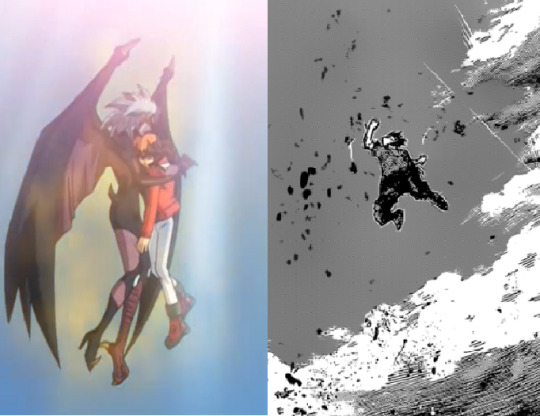
SHIGARAKI VS. YUBEL: HOW TO SAVE YOUR VILLAIN
The failure of Deku to save Shigaraki isn’t just a tragic conclusion for Shigaraki’s arc, it’s also My Hero Academia failing as a story. When I say the story failed, I mean the story has failed to answer any of the questions it asked its audience. It’s themes, character arcs, everything that communicates the meaning of the story to the audience is no longer clear.
Saving Shigaraki was the central goal of not only the story itself, but the main character Deku. By failing in its goal you can’t call this a good ending. In order to illustrate why this goal of saving the villain is so important to both Deku’s character and the central idea of MHA, I’m going to provide a positive example in Yu-Gi-Oh GX were the main character Judai successfully saves their villain. One of these stories fails, and the other succeeds. I will illustrate why under the cut.
BROKEN THEMES = BROKEN STORY
When artists draw they have to consider things like perspective, anatomy, shading, light, coloring. Drawing has rules, and it’s hard to produce good art without knowing these rules beforehand. If I draw something that has bad anatomy, you can criticize me for that.
Writing has rules, just like drawing. The rules of storytelling are important because writing is an act of communication. You can write whatever you want, just like how you can draw whatever you want, but if you break the rules the audience won’t understand what you are trying to communicate.
When I refer to MHA as a broken story, I am referring to the fact that it has broken the rules of storytelling. As this youtuber explains.
“I guess we should first define what broke and broken even means in this context. Has the story turned into an unintelligible mess? Not really. Value judgements aside, the narrative is still functional and fulfills the criteria of being a story. So how can a story that still functions be broken? Maybe to you it cannot. But to me a story that is still functional isn’t enough. What I mean when I say MHA is broken is that it’s lost something crucial. A codifying style of structure, pacing and payoff that until a certain point was the core of its identity.”
I could launch into a long-winded explanation of what themes are, but for the sake of simplicity I like to define themes in terms of “Ask, and answer.” The author asks a question to the audience, and then by the end of the story provides an answer. The audience is also invited to come up with their own answer which prompts them to think about the story on a deeper level. The question both MHA and GX are asking both its main characters and the audience is “Can you save the villain?” with the additional complicated question of “Should you save the villain?” This post will detail how both stories go about answering those two questions, and more importantly why those answers matter for the story.
With Great Power… You know the rest.
My Hero Academia and Yu-Gi-Oh Gx are actually similar stories once you get past their superficial differences. MHA is a story with way better worldbuilding, compared to a society where everything revolves around the trading card game, and people go to school to be better at a trading card game.
However, if you get past that. They are both bildungsroman, stories about the main characters growing up into adults. They both have an academy setting where the goal is for the main character to graduate and enter the adult world. They are both shonen manga. GX is the sequel of Yu-Gi-Oh a manga that ran in Shonen Jump the exact same magazine as MHA. The biggest point of comparison is their main characters, who both start out as young and naive who are driven by their admiration of heroes. Deku is a fan of All Might who wants to become a hero despite not having a quirk, because he loves All might who saves everyone with a smile. Judai’s entire deck archetype revolves around “Elemental Heroes’ and later “Neo-Spacians” who are all based on popular sentai heroes like ultraman.
The central arc for both characters is to grow up. Growing up for both of them not only requires figuring out what kind of adult they want to be, but also what kind of hero they want to be.
Now I’m going to drastically oversimplify what a character arc is.
A character arc first starts out with the character being wrong. Being wrong is essential because if the character is right from the beginning, then there’s no point in telling the story. A character often holds the wrong idea about the world, or has some sort of flaw that hinders their growth. The narrative then needs to challenge them on that flaw. It usually sets up some kind of goal or win condition. That flaw gets in the way of a character “winning” or achieving their goal, so they need to fix that flaw first. If their ideals are wrong, then they need to think about what the right ideals are. If they’re too childish, they need to grow up. If they have unhealthy behaviors or coping mechanisms, they need to unlearn it and require better ones. Otherwise, that flaw will keep sabotaging them until the end.
I’m borrowing the word “win condition” from class1akids here because it’s an incredibly appropriate terminology. Midoriya needs to do “x” in order to win, otherwise this victory doesn’t feel earned. The “x” in this case is usually character development. As I said before, a story where the main character hasn’t changed from beginning to end feels pointless. Especially in Deku’s case, he was already a brave, strong hero who would charge right into battle and defeat the bad guys in chapter one, so him defeating Shigaraki in a fist fight doesn’t represent a change.
The story sets up not only “What does the hero need to do to win?” but also “How does the hero need to change in order to win?” A character either meets these requirements before the end of the story, or they don’t and usually this results in a negative ending.
MHA in its first half quite clearly set up both the final conflict of saving the villains, and also that saving the villains is its “win conditions.” The hero shouldn't be allowed to win without first fixing this flaw.
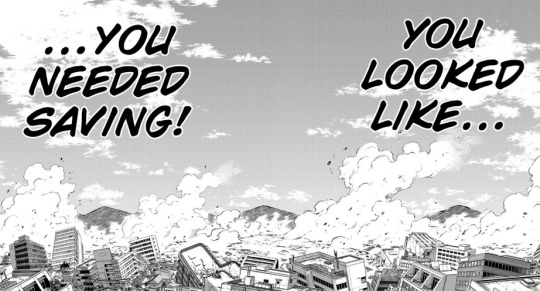
From this panel onward the central question Deku is forced to answer shifts from “Am I strong enough to defeat ShigarakI” to “Can I save Shigaraki?” However, much earlier than that All Might goes on to basically set up the win conditions of what makes the ultimate hero as someone who “Saves by winning, and wins by saving.”
All might: You can become the ultimate heroes. Ones who save by winning, and win by saving.
Therefore the story has set it’s criteria for what kind of hero Deku needs to become. If he wins without saving, then he’s failed to become what the series has set up as the Ultimate Hero.
Shigaraki and Yubel aren’t just narrative obstacles, or boss monsters to be killed like in a video game. They are narrative challenges, which means that the character can’t grow in any way if they don’t answer the challenge presented by the characters. They are villains who actively resist being saved, to provide a challenge for two heroes who define their heroism by saving others. The challenge they pose adds a third question to the story and the main characters.
"Can I save the villain?"
"Should I save the villain?"
"If I don't save the villain, then can I really call myself a hero?"
In other words the decision they make in saving, or not saving their final antagonist defines what kind of hero they are. In Deku’s case it’s even more critical he defines what hero he wants to be because the MHA is also a generational story, and several of the kids are asked to prove how exactly this generation of heroes is going to surpass the last one. The kids growing physically stronger than the last generation isn’t a satisfactory answer, Deku getting strong enough to punch Shigaraki hard is not a satisfactory answer, because we are reading a story and not watching a boxing match.
I’m going to focus on the last two questions though for a moment. Many people who argue against saving villains like Shigaraki argue he is a mass murderer and therefore isn’t worthy of salvation. However, the act of saving Shigaraki isn’t a reflection of Shigaraki himself, but rather the kind of hero Deku wants to be. It all boils down to Spiderman. In the opening issue of Spiderman, teenage Peter Parker is bitten by a radioactive spider and suddenly gains super strength, the ability to stick to walls along with other powers. However, being a teenager he uses these powers selfishly at first. He doesn’t feel the obligation to use his powers for other people, and therefore when he sees a robbery happening right in front of him he lets the robber go. However, because he lets the robber go, the robber then attempts to hijack a car and kills his Uncle Ben in the process. If Spiderman had stopped the robber then he might have prevented that from happening. He had the power to stop the robber, but he didn’t feel responsible or obligated to save other people. As a result Uncle Ben dies. It’s not enough to have power, ti’s how you use that power that reflects who you are, therefore: “with great power comes great responsibility.”
The choice to save Shigaraki actually has little to do with whether or not Shigaraki is redeemable, but rather how Deku chooses to use his power, and what he thinks he is responsible for reflects who Deku is as a person. Deku himself also clearly outlines how he wants to use his power, that One for All is a power for saving, and not killing.
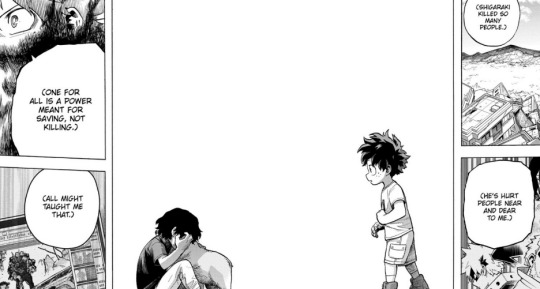
How he uses his power reflects Deku’s ideal in saving others, and therefore if he doesnt use his power to save, then he’s failed to live up to his ideals. It's not whether it's morally right to save a murderer like Shigaraki, but rather the way Deku wants to choose to use his power. It's about whether he feels the responsibility to save others.
Judai explores an incredibly similar arc to Deku. They are basically both asked what kind of responsibilities a hero is supposed to have, which is also a metaphor for growing up to handle the responsibilities of adulthood. As both characters start out with incredibly naive and childish ideas about what a hero is. Therefore realizing what a hero is responsible for is key to them growing as a character. However, Judai is different from Deku. In some ways he’s more like Bakugo. Judai is a prodigy who’s naturally good at dueling. He doesn’t duel to save others, but rather because duels are fun and he’s good at it. He’s very much like Bakugo, who admired All Might as a hero just as much as Deku did, but admired the fact that he was strong and always won rather than he saved others.
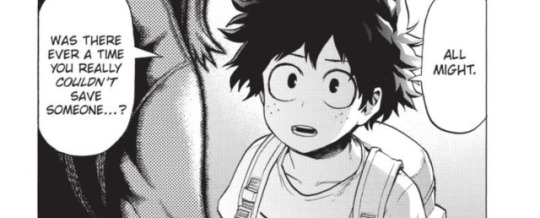
However, I would say both Deku and Judai are questioning what a hero is responsible for. They are both asking if they have the responsibility to use their power to save others. If they have to fight for other people, just because they have power. His first big challenge as a character comes from Edo Phoenix, who calls out Judai for not thinking through what it means to be a hero, and what responsibilities heroes carry. Judai duels because he thinks it’s fun. He will show up to duel to help his friends, but that’s because he’s the most powerful person in the group. Even then it’s because he finds fighting strong opponents to be enjoyable. Bakugo will beat up a villain, but for him it’s more about winning then if the action will save someone or not.
Judai is more often than not pushed into the role of being a hero, he doesn’t play the hero because he’s a particularly selfless person, and he’ll often avoid responsibility if not forced. He has power but no sense of responsibility and the narrative calls them out as a problem.
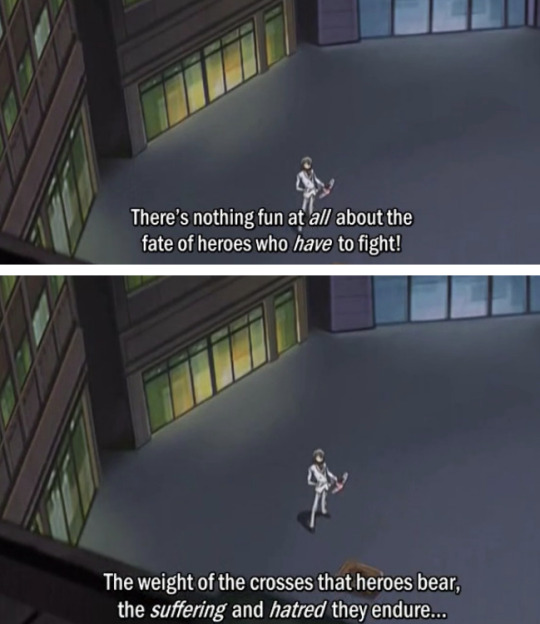
Edo: Can you even fathom that, Judai?
For Judai, he can’t understand the responsibility of being a hero. For Deku, he idealizes heroes so much he can’t understand that there are people out there the heroes have failed to save. These two callouts towards Deku and Judai are discussing similar because they’re both discussing where a hero’s responsibilities lie. Is a hero responsible for saving everyone? Is someone strong like Judai responsible for using their strength to help other people?
Judai’s arc continues into the third season where he’s not shown to just be naive but ignorant. He’s not just childish, he actively resists growing up because he doesn’t want to take on adult responsibilities.
THe same way that Deku just decides not to think about whether or not All Might failed to save people in the panels above. However, in Judai's case he's actively called out for his choice to remain ignorant.
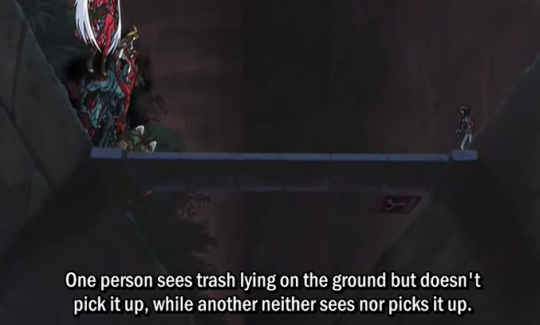
Satou: Now, which one is at fault? Judai: Isn’t it the guy who saw it, but didn’t pick it up. Satou: Not quite. If one is aware of the trash that fell, it may be picked up someday. But there is no possibility fo the unaware one ever picking it up. Judai-kun you are the foolish one unaware of the trash that has fallen. Judai: Are you calling me out for how I am? Satou: Your behavior towards me was atrocious. The worst was attending class only for credit, even if you were there you only slept. Judai: Yeah, I know. I was all bad, but it wasn’t that big a- Satou: It is important. You see, one by one, the students inspired by your attitude were losing their motivation. Now if you were a mediocre duelist, then this would not be an issue. Satou: However, you are the same hero who defeated the three mythic demons. Every single student in the academy admires you. You should have been a model for this academy. Judai: Me, a role model? Are you kidding? I just do whatever I feel like doing. Satou: Great power comes with great responsibility. Yet, as you remain unaware of that, you’ve spread your lethargy and self-indulgence.
seems like a minor issue, but look how Judai responds to the accusations. “I just do whatever I feel like doing.” Satou is arguing that Judai should pay attention to the influence he has on others because of his power, because how he chooses to use that power affects others. However, Judai chooses to actively not look at the consequences of his actions because he doesn’t want to take on that level of responsibility, and therefore he’s looking away from the trash.
While it seems like it doesn’t matter in Satou’s specific example, not thinking of the consequences, or how you use your power can have unexpected consequences. Spiderman doesn’t feel like it’s his responsibility to stop a bank robber, and that bank robber shoots his uncle. You could still argue it’s not Spiderman’s responsibility to stop every crime in the world, and I guess no one owes anyone anything from that point of view - but Spiderman failing to act responsibility had the consequence of directly hurting someone else.
Spiderman has to live with that consequence because it was his own Uncle that was hurt. This is where we really reach the duality of Judai.
In GX, Judai is, symbolically speaking, The Fool of the Tarot Deck, the Novice Alchemist — a person brimming with infinite potential, yet one who is also supremely ignorant, who walks forward with his eyes closed and often unknowingly causes harm in his great ignorance. In this, he is very much the embodiment of the faults we most commonly associate with teenagers — selfishness, recklessness, shallowness, a lack of dedication or empathy when it’s most needed. Like most people, he has good traits that work to balance out some of the above, but his narrative path through GX ends up being that of the flawed hero undone by his faults — and then that of the atoner, the repentant sinner. In his case, the mistakes of his teenage years are the catalyst for his growth from a boy into a man burdened with duty and purpose. Judai is someone with infinite potential, with great power, but also ignorant on how he should use that power, and that makes him an incredibly flawed hero who needs to learn how that power should be used.
Deku similarly exists in a society where heroes deliberately turn a blind eye to the suffering of a certain type of victim. Shigaraki’s speech heavily resmebles Satou’s speech about garbage on the side of the road.
Shigarali: "For generations you pretended not to see those you coudln't protect and swept their pain under the rug. It's tainted everything you've built."
Deku shares Judai’s ignorance, because he’s not only a part of a system that doesn’t even see trash on the side of the road, but he also worships heroes so much that he’s incapable of criticizing them. If Deku saw the flaws of heroes, but at first didn’t have the courage to speak out, but eventually gained the courage that would be one thing. However, if he doesn’t see the flaws of heroes, then the problem will never be fixed.
There are also consequences for both Judai and Deku failing to use their powers responsibly. These consequences take the form of the villains who came about because of all of society’s ignorance to the suffering of victims (Shigaraki) and because of the main character’s ignorance to their suffering (Yubel). Shigaraki and Yubel are also explicitly victims that the heroes failed to save, turned into villains who are active threats to the heroes.
Should I save the villain?
The answer is yes, because the decision to save is reflective of the kind of hero each character wants to be. Each story clearly sets up that Deku and Judai aren’t punisher style heroes who shoot their villains, they are being set up as heroes who save. Deku needs to “save by winning.” As for Judai, a big deal is made of Judai’s admiration for another character Johan who represents a more idealistic kind of hero. Johan unlike Judai is someone who duels with a purpose, something Judai outright says he admires because he’s empty in comparison.
Judai: Johan what have you been dueling for? See, it’s about fun for me… Well, for the surprise and happiness too. I guess I do do it for the fun. Sorry, I guess I put you on the spot by asking out of nowhere. Johan: What’s this about Judai? Judai: It’s nothing. Johan: I suppose there is one goal I have. Johan: Even if someone doesn’t have the power to see spirits, they can still form a bond with a spirit. That’s why I do it for people like him. [...] Johan: I'll fight for everyone who believes in me, and I'll do it with my Duel Monsters. Judai: I'm jealous you've got feelings like those in you.
Becoming a hero who uses their power to help others isn’t just a goal the story sets for Judai, it’s a goal that Judai sets for himself because of his admiration for Johan. Johan represents the idealistic hero Judai wants to be, but is also held back from because of his personality flaws. Johan represents the kind of heroic ideal that Deku is aspiring to be.
Johan’s ultimate goal isn’t punishing the wicked, but to use his power to save others.
Johan: Judai, it was my dream to save everyone through my dueling!
The story sets up the idea that it’s not enough for Judai to simply be strong, he’s also challenged to become a savior who uses his power to help others like Johan. Deku needs to “save by winning” and Judai needs to “Save everyone through his dueling.” However, Johan also adds another condition to what saving means. His idea of saving isn’t to defeat a villain, but rather his dream is to help connect spirits and humans together, even if there are humans who can’t see spirits. Johan doesn’t save people with the power of physical force, but rather the power of human connection.
Should I save the villain?
Here the answer is "Yes", because wants to become more like Johan someone who uses their power to help others not just for themselves. Then we reach the third question
If I don't save the villain, can I really call myself a hero?
It once again comes to power and responsibility. Heroes have great power, and they are responsible in how they use that power, if they use it irresponsibly then there are consequences. Shigaraki wants to destroy hero society, because the heroes irresponsibly use their power to turn a blind eye to everyone’s suffering.
People suffer when heroes fail to live up to their responsibilities. The entire conflict of season 3 is created by Judai failing to save Yubel. If Judai had helped Yubel when they most needed it, instead of abandoning them, then Yubel would never have been twisted by the light of destruction, would never have attempted to teleport the school to another dimension, would never have attacked all of JUdai’s friends.
These consequences matter. Deku can turn his eyes away from Shigaraki’s suffering, but let’s say a hero failed to stop a robbery, or rather he didn’t even try, and because of that his mom was shot and died in the street. Would Deku consider the man who failed to stop a bank robbery a hero? When Spiderman let a bank robber go instead of trying to stop him, was he being a hero in that moment? Both the stories and the characters themselves have defined heroes as people who use their powers to save others, therefore if Judai and Yubel fail to save their villains then they can’t be called heroes by the story’s own definition. Now let’s finally return to the question of "Can I save the villain?"
Was there ever someone you couldn’t save?
m going to start with Yu-Gi-Oh Gx as a positive example of how to save your villain. Gx works for two reasons. One, it’s established from the start that Yubel isn’t beyond salvation, and two, it makes it so Judai can’t win without saving Yubel. The conflict of the story does not end until Judai makes the decision to save Yubel. In some ways the writing is even stronger because Judai is directly responsible for the pain and suffering that Yubel went through that turned them into a villain in the first place. Yubel isn’t just a victim, they’re specifically Judai’s victim.
Yubel is a duel spirit who is also essentially Judai’s childhood friend. A duel spirit just like the kind that Johan wants to save. During their childhood Yubel got too overprotective of Judai, and started to curse his friends for making him cry or upsetting him in any way. Until everyone Judai’s age started avoiding him and Judai became all alone with only Yubel for company. Judai’s decision was to abandon Yubel at that time. He took the yubel card and shot them into space, hoping that being bathed in space rays will somehow “fix” what was wrong with them. I know that’s silly but just go with it. Judai abandoning Yubel had the unintended consequence of Yubel being subjected to the light of destruction, a corrupting light that subjected Yubel to years of pain. This pain literally takes the form of Yubel burning alive.
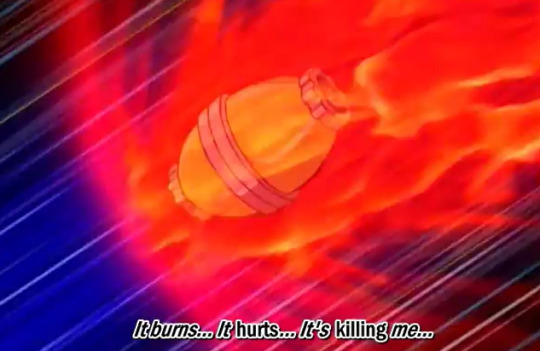
Yubel connected to his dreams called out for Judai every night, only for Judai’s parents to give him surgery that repressed his memories of Yubel causing him to forget them entirely. Yubel then spent the next ten years alone in space, continuously subjected to painful torture, with their cries for help being ignored.
"I was suffering even as you came to forget about me..."
Yubel is then met with the question of how can Judai treat them this way if they loved him so much? As from Yubel’s perspective, they’ve only ever tried to protect Judai, only for Judai to not only throw them away, but subject them to painful torture and ignore their cries for help. Judai effectively moves on with his life, goes to duel academy, makes friends while Yubel is left to suffer in silence all but forgotten. This is where Judai’s ignorance has serious plot consequences.
It’s not just the pain that Yubel endured that made them snap. It’s that their pain went ignored.
Yubel holds out the faint hope that Judai will answer their calls fro help until they finally burn up upon re-entry into earth’s orbit. At which point they’re left as nothing more than a single hand crawling on the ground. Yubel who cannot fathom why Judai would cause them so much pain, and then forget about them, convinces themselves that Judai must be causing them pain, BECAUSE he loves them.
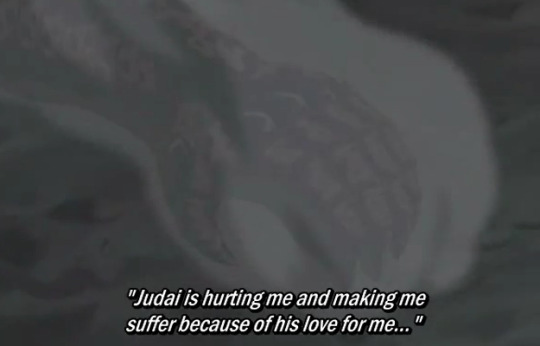
But you see, I couldn't possibly forget about you in the time that I've suffered...
Judai is allowed to move on with his life, to make friends, to spend the next ten years doing so while Yubel is subjected to ten years of agony. When they finally escape their painful torment, they see all the friends Judai has made while they’re left alone and forgotten. However, Yubel’s goal isn’t revenge. Rather, it’s to make Judai share and recognize their pain. WHich is why I said it’s not the fact that they were made to suffer, but their suffering is ignored. Yubel’s entire philosophy revolves around the idea that sharing pain is an expression of love, and that they and Judai share their love for each other by hurting each other.
"That's why I sought to fill all those linked to you, your world, with both sadness and anguish..."
For Yubel, making all of Judai’s friends suffer and Judai themselves suffer is a way of making them and Judai equals again. They want to show “their love” for Judai, but it’s more about forcing Judai to recognize the pain he’s caused them by forcing him through the same pain. Yubel’s philosophy of sharing pain is actually a twisted form of empathy.
They’re not entirely wrong either, that even people who love each other can cause each other pain, and that if one person is suffering alone in a relationship or the suffering is one-sided then there’s something wrong with that relationship.
Yubel: I get it now… You weren’t in love, with Echo. Yubel: No.. you may have loved her just enough to clear the conditions in palace for you to control Exodia, but the you didn’t truly love each other. Yubel: You were only unfairly hurting her, while you stayed unharmed. You wouldn’t suffer. You wouldn’t suffer. You wouldn’t be in pain. Amon: What are you getting at? Yubel: I’ve been hurt! I’ve suffered! I’ve been in pain. That’s why I’m making JUdai feel the same things I did!
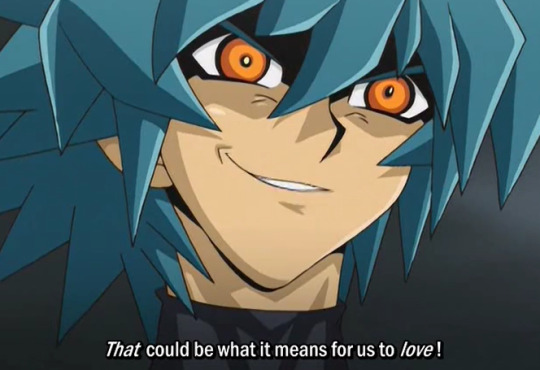
Yubel’s twisted theory of love, is a pretty thinly veiled cry for empathy.
They break out into tears when talking to Amon about the way they’ve hurt and suffered. They clearly state upfront that their goal is for Judai to recognize their love. One of the first things they say to Judai is a plea for Judai to remember them.
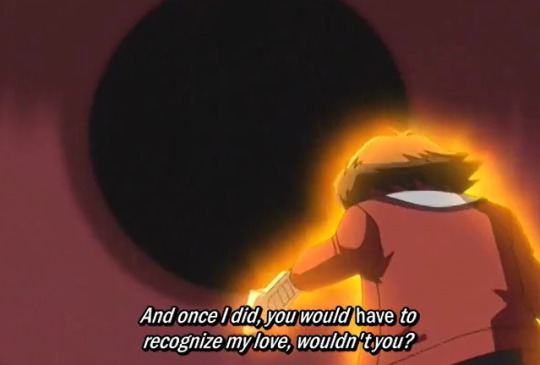
Yubel is presented as a very human character suffering through a lot of pain throughout their entire villai arc, they break down into tears multiple times, they cry out in agony, they're visibly suffering and you see their mental walls begin to break down when Judai denies them any empathy.
Yubel is actually incredibly clear and straightforward about their desire to be saved by Judai. However, Judai doesn’t lift a single finger to help Yubel the entire arc, even though they themselves admit they are directly responsible for Yubel’s suffering but they helped create who they are today.
Judai plunges into a different dimension and gives up everything to save someone, but it’s Johan, not Yubel they try to save. You have Johan, the perfect friend, and perfect victim that Judai gets obsessed over and will not stop at anything to save, and then you have Yubel, the imperfect victim that is actively harming Judai and all of his friends that Judai chooses to ignore. The whole season Judai only focuses on saving the perfect victim Johan, and this is clearly shown to be a flaw. Judai doesn’t just ignore Yubel to save Johan, he also ignores every single one of his friends.
Judai only caring about saving Johan, and deliberately ignoring and abandoning the friends who came with him to help, essentially abandoning them the way he did Yubel leads to another consequence. After he abandons them they get captured, rounded up, and actually die and become human sacrifices.
Losing his friends, causes Judai to snap. Judai becomes the supreme king and decides power is all that matters; he starts killing duel spirits en masse in order to forge the super polymerization card. Which means being left alone, suffering alone, being abandoned by everyone causes Judai to snap the exact same way that Yubel did.
In fact Judai is only saved from his darkest moment, because two of his friends sacrifice their lives, trying to get through to him and appeal to his humanity. At that point Judai’s friends could have just chosen to put him down like a mad dog, to punish him for the amount of people he’s killed, but instead they try to save him because of their friendship.
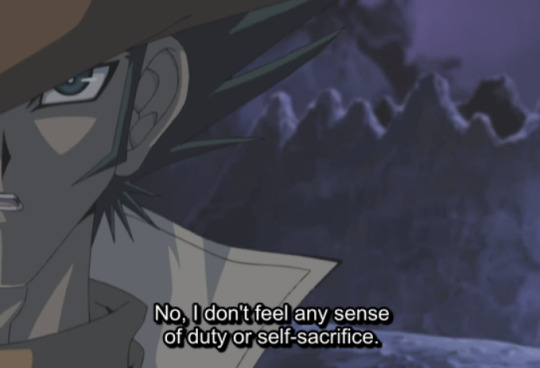
I just want to save my friend. That is all.
By the time Judai is facing Yubel in their final fight, Judai doesn’t have the moral highground against Yubel in any way whatsoever. They’ve both lashed out because of the pain they endured and killed countless people in the process of lashing out. The only real difference between them is that Judai is lucky. He had friends to support him at his lowest point, while Yubel didn’t. Does Judai learn from Jim’s example, and go out of their way to save Yubel the same way they were saved because Yubel is still a friend? Nope, Judai tries to kill Yubel at this point.
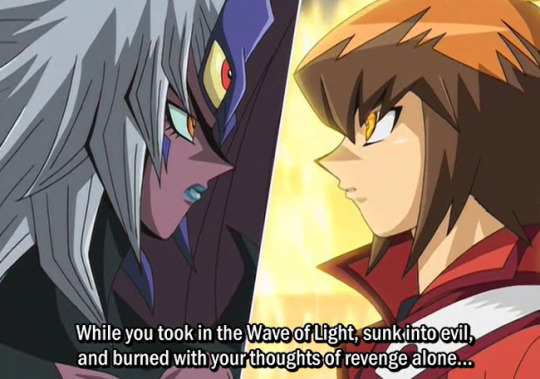
I made a lot of friends... And they all taught me something… real love is wide enough, large enough and deep enough to fill the universe. Your so-called love is only a conceited delusion.
Like, Judai, sweetie baby honey darling. How was Yubel supposed to make friends when they were floating in the empty void of space?
Judai hasn’t learned, they are still ignorant, and still turn a blind eye to Yubel’s suffering. After all if his love is wide enough, large enough,and deep enough to fill the universe then why don’t thy have any room in their heart whatsoever for empathizing with Yubel?
Judai making friends while Yubel was trapped in space doesn’t make Judai a better person than Yubel, it makes Judai lucky. Judai doesn’t even appreciate that luck, because he treats his friends like garbage. It’s not about whether Yubel is worthy of salvation, because Judai is a mass murderer and his friends still went to great lengths to save them anyway. It’s that Judai doesn’t want to empathize with Yubel, because they still want to remain ignorant and irresponsible. Judai wants to continue playing hero, with a very black and white definition of what a hero is. By this point Judai’s killed lots of people, but if he makes Yubel the villain in the situation, he can keep playing hero. He doesn’t have to look at himself and what he’s done, because blaming everything that happened on Yubel and then putting Yubel down like a mad dog allows Judai to absolve his own guilt. Judai practically ignores Yubel’s cries for help, even when Yubel spells it out for them.

I couldn't have lived with the heartache unless I felt that I was being loved...
At this point Yubel themselves acknowledges that their love was just a delusion. That it was a coping mechanism, because they couldn’t live with all the pain otherwise. WIthout it they would have just died, which makes Judai unmoved. The implication here is that Judai thinks yes, Yubel should have just died in that crater. It would have been easier for Yubel to die a perfect victim, then for Yubel to crawl out of that crater and go on to hurt other people. While that may be true the same can be said for Judai - it would have been better if Judai died rather than become the Supreme King. His friends could have put him down like a mad dog, you could have even called that justice - but they didn’t. Judai making no attempt to save Yubel isn’t because he thinks it’s morally wrong to save someone who’s killed as many people as Yubel has, or because he thinks he can’t forgive Yubel, it’s because Judai is taking the easy way out. Johan is a nice, easy victim to save, because he’s Judai’s perfect boyfriend, while Yubel is a complex victim that requires Judai to understand their suffering. Even the act of saving Johan isn’t about Johan himself, it’s about the fact that Judai feels guilt over Johan’s disappearance. What Judai wants isn’t really to save a friend, but to stop feeling guilty over that friend. Judai isn’t just disgusted by Yubel’s actions towards his friend, he also wants to avoid the guilt he feels over causing all of Yubel’s suffering, because it requires acknowledging the complex reality that he is both victim and perpretrator in this case, just as Yubel is both victim and perpetrator.
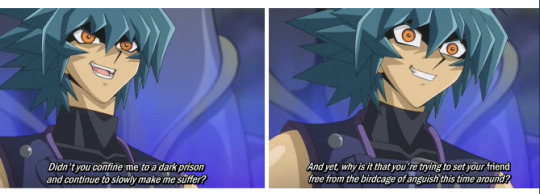
So how can an arc where Judai doesn’t try to save Yubel until the last possible minute, be better than an arc where Deku makes it his goal for the final act of the manga to save the crying boy in Shigaraki?
It’s because the story does not let Judai get away with his continual refusal to empathize with Yubel. Yubel’s entire character revolves around empathy, in the form of sharing pain. As a duel monster, Yubel’s effect is that they are a 0/0 attack monster who is immune to all damage, but when you attack them they deal all the damage back to you. Which means that Yubel will respond to all the pain they feel, by causing you just as much pain in return. Yubel is not a character who can be defeated in a fight, or a duel. In fact they’re the only Yu-Gi-Oh villain who never loses a duel once. The most Judai can do is duel them to a draw, and they draw three times. Yubel wins against everyone else who challenges them. In a way Yubel is like Shigaraki, the ultimate, unkillable enemy that can’t be done away with violence. Judai’s refusal to empathize with Yubel or attempt communication also makes them worse, every time Yubel is hurt they escalate. THe more Judai hurts them, the more they will hurt in return, it’s a cycle that will never be broken simply by killing Yubel, because Yubel is unkillable.
Not only that but the story has gone to great lengths to show that saving Yubel is the correct course of action. If Judai doesn’t save Yubel, he’s basically spitting on the selflessness Jim showed in saving him. In fact if he doesn’t save Yubel, Judai is contradicting his own words on what makes a good friend. Sho once asks Judai after witnessing his brother change, what he should do if a person you lov ehas changed into an entirely different person. What if they're a person you don't even recognize any more? A person you don’t even necessarily like anymore?
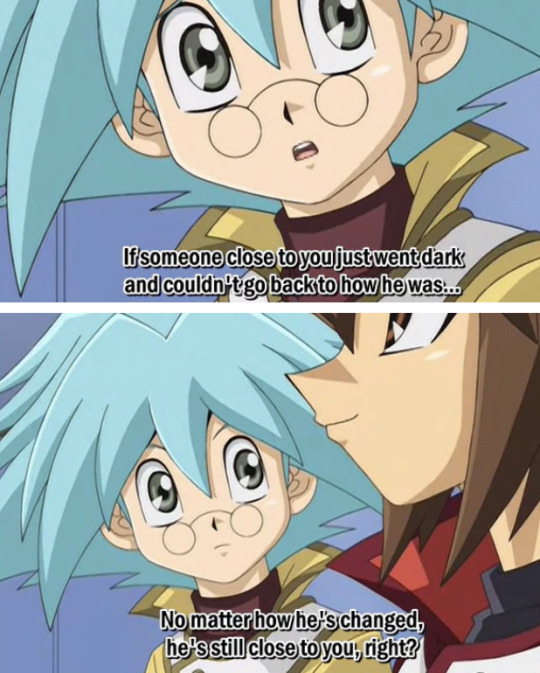
That's why if it were me. I'd probably just be looking after him until the very end, even if I didn't like him. I'd do it cause I think it'd prove that I care about him.
Judai doesn't even say that Sho is obligated to save his brother or morally redeem him, just that he has to keep looking at him instead of turning away or ignoring him.
Judai is being a bad friend, by his own definition. By choosing to deliberately look away from Yubel, Judai’s not living up to his advice for Sho for how you treat people you care about.
Which is why the resolution for Judai and Yubel’s arc is so important, because it’s done by Judai finally acknowledging Yubel’s pain, and promising to watch over them from now on, words that are followed by the action of physically fusing their souls together so they’ll never be alone again. Judai doesn’t just say pretty words about how they won’t ignore the crying child inside of Yubel, but instead he makes a sacrifice to save Yubel at risk to themselves to show their words are backed up by actions. Judai says Yubel will never be alone again, and then he commits.
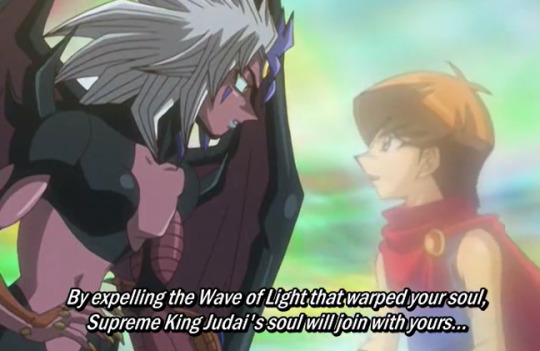
"And even if that means I won't exist anymore... I don't care."
Judai has resolved his character arc by this action, because Judai is finally taking on responsibility and that responsibility is watching over Yubel, so the two of them can atone together. Judai even says himself this isn’t an act of sacrifice on his part, but rather him finally accepting adult responsibilities.
Judai: I wouldn't sacrifice myself for you guys. I'm just going on a journey to grow from a kid into a man.
Judai needed to save Yubel to complete his character arc and grow as a person. If Judai hadn’t saved Yubel, he would have still remained an ignorant child. By learning not to turn a blind eye to Yubel’s pain, and also smacking sacrifices and physically doing something to atone for the way they ignored Yubel up until this point they’ve not only saved Yubel they’ve also done something to address their wrongs. This also continues into the fourth season where Judai’s personal growth results in him learning what kind of hero he wants to be as in Season 4 in order to atone for the spirits that Judai slaughtered, he decides to leave his friends behind and walk the earth with Yubel helping spirits and humans get along with each other. In fact Judai’s final speech as a character isn’t even about how strong he is as a hero, but how weak he is as a person.
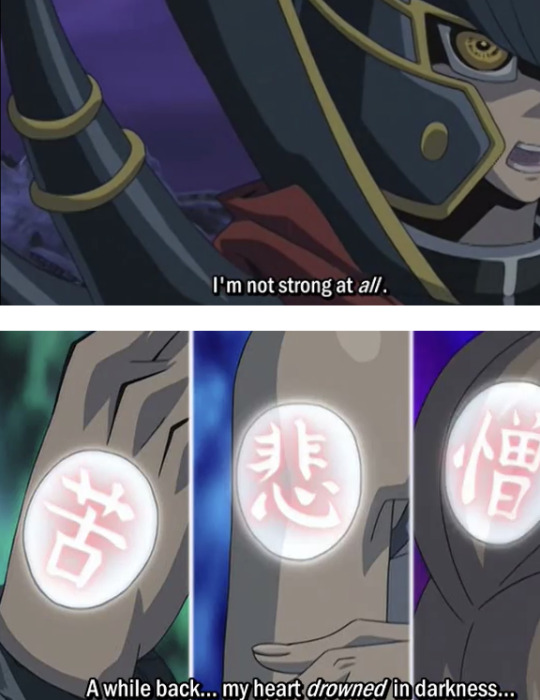
And I put my friends through some rough times. Form that, I figured a few things out... all I can do is believe in them.
The lesson Judai learned is because he’s weak, he needs to empathize and believe in other people the same way that his friends once believed in him when he was at his lowest point. Judai’s not the strongest hero, he’s the weakest one, but that gives him the ability to empathize with people who were lost just like he was, and guide them back from the darkness.
The story of how Deku became the worst hero.
I’m going to say this right now it might turn out next week that Shigaraki is just fine, and he’ll use the overhaul quirk to reconstruct his body. However, even if that happens Deku has completely failed at his goal of saving Shigaraki for the reasons I’ll illustrate below. In theory, Deku’s arc of saving Shigaraki, and therefore winning by saving should be much easier for the story to accomplish and also much less frustrating to watch. After all, Shigaraki has been around since the beginning of the manga, he’s literally the first villain that Deku faces. He’s also the first villain that Deku talks to, where he brings up the idea that there were some people All Might failed to save. There’s also many intentional parallels between the two characters, the entire manga is about their parallel journeys of becoming the next generation hero and the next generation villain. Shigaraki even directly quotes the line at one point that all he wanted was for someone in his house to tell him he could still be a hero, the same line Deku said in the first chapter was that he wanted his mom to tell him to be a hero instead of apoalogizing to him for being quirkless.
Not only is the setup for Shigaraki and Deku made obvious (Deku can redeem Shigaraki by telling him that he can still be a hero too), but Deku himself states out loud that he wants to save the crying child inside of Shigaraki.
Judai runs away from Yubel the whole time, whereas Deku is running towards Shigaraki and actively makes it his goal to understand Shigaraki and continue to see him as a human being rather than a villain. The story also makes it clear that saving Shigaraki is necessary to saving hero society as a whole. After all Yubel is just Judai’s victim. Whereas Shigaraki is the victim of all of society. He’s the crying child who was ignored. The cycle won’t be broken if heroes continue choosing to ignore people like Shigaraki, because more victims will grow up to replace him.
Shigaraki: Everything I've witnessed, this whole system you've built has always rejected me. Now I'm ready to reject it. That's why I destroy. That's why I took this power formyself? Simple enough, yeah? I don't care if you don't understand. That's what makes us heroes and villains.
Shigaraki rejects the world because the world continues to reject him. THe solution to this problem is not rejecting Shigaraki, because Shigaraki won’t go away, the system will just continue to reject people like Shigaraki. As long as heroes and villains don’t understand each other, they’ll keep being forced to fight and the conflict won’t end, because hero society is what engineers it’s own villains.
clear as day by the story itself. If the objective of saving Shigaraki is clear, then how exactly did the story fail in this objective? What went wrong? In this case it’s a failure of framing, and breaking the rules of “show don’t tell.” Stories are all about actions and consequences. When a character makes a certain action in a story, the way other characters around them, the world, and whatever consequences that action frames that action in a certain light. It provides context for how we are supposed to interpret that character in that moment.
For example, when a character does something wrong and another character directly confronts them over what they did wrong, that frames them as in the wrong. The story is criticizing the character for what they did wrong. Context is everything in a story. Stories are just ideas, so they require framing and context to communicate those ideas for the audience. Certain character attributes can be strengths or flaws depending on the context. My go to example is that if you put Othello in Hamlet, the conflict would be resolved in five seconds because Othello’s straightforward personality and determination would have him kill Hamlet’s uncle without questioning things. Whereas, Hamlet constantly questioning and second guessing himself would lead to the worst ending possible. However, if you put Hamlet in Othello, then Hamlet wouldn’t fall prey to Iago’s manipulations, because Othello doubts and questions everything so he wouldn’t believe Iago the way Othello did.
Hamlet’s contemplative and introverted nature can be a strength in one situation, and a flaw in another. Othello’s tendency to act without thinking things through can be a strength in one situation, and a flaw in another. Context matters, because context tells you how you’re supposed to interpret a certain characters actions, and therefore tells you more about that character. This is why people repeat “Show don’t tell” as the golden rule of storytelling, it’s one thing to say something about a character, it’s another to us the characters actions in the story itself to show them something about the character.
What’s even worse then breaking the rules of show don’t tell however, is telling the audience one thing, and then going onto show in the narrative something completely different. In that case the narrative becomes muddled and confusing to read. If I the narrator say “Hamlet is someone who overthinks everything” and then in the story Hamlet walks up to his uncle and kills him with no hesitation, then the narrator is straight up unreliable. It becomes impossible to tell as an author what message I’m trying to get across about these characters, because I’m telling you one thing and showing another.
This is why the writing fails in the second half of My Hero Academia because we are constantly told one thing, but then the story shows something entirely different and sometimes even contradictory to the thing we are being told.
Judai is a much worse hero than Deku, he always runs away from Yubel, and we’re never directly told that he’s supposed to save Yubel either. However, the narrative is incredibly consistent. Judai’s behavior of running away is consistent with his character. All the other character call Judai selfish for abandoning his friends (and they’re not even talking about Yubel). Judai is never painted in any positive light for his actions, therefore we as the audience understand Judai’s behavior is wrong and he needs to fix it. The narrative makes it clear that Judai needs to grow up, and Judai is never rewarded for his refusal to grow up, he’s ruthlessly chewed out, not by his enemies but also by his own friends. However, the narrative isn’t merciless on him either. Season 3 of GX is dark, but it’s not grimdark. Even when Judai loses his way, he’s still shown love and compassion by those same friends who go to great lengths for his sake. The narrative criticize Judai but it never insists that he’s beyond redemption and needs to be put down like a mad dog.
The message is very clear, that not only does Judai need to grow up, but he also deserves the chance to grow and change, which is why he should give Yubel a similar chance. In comparison the story sets out this clear narrative arc for Deku of understanding Shigaraki, but it never challenges him for failing to understand Shigaraki. If you listen to what the narrative says, how other characters describe Deku, and what Deku himself says and only read it on a surface level then yes, Deku’s goal is to save Shigaraki. If you analyze actions however, he is in effect just like Judai he never takes any meaningful action or steps towards Shigaraki, nor does he think of what saving Shigaraki might look like or entail.
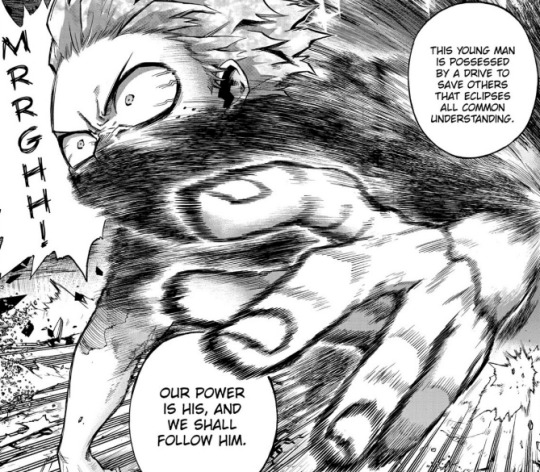
The story describes Deku as someone who is possessed by a drive to save others that eclipses all common understanding, but does the story give us any examples of that behavior?
Judai is characterized as a selfish, irresponsible child, and the story gives us countless examples of his immaturity and how it hurts others. Does the story of MHA do the same for Deku's purported virtues? Let’s run through Deku’s actions, step by step, the actions themselves and how they are framed in order to find any evidence that Deku possesses this drive to save others. Does Deku reflect at all on the question of:
Can Shigaraki be Saved?
Deku leaves on a journey to try to understand villains. When he makes a perfunctory attempt to understand and empathize with Muscle, and Muscle replies that some people are just evil does Deku keep trying to reach his heart? Nope, he just punches him.
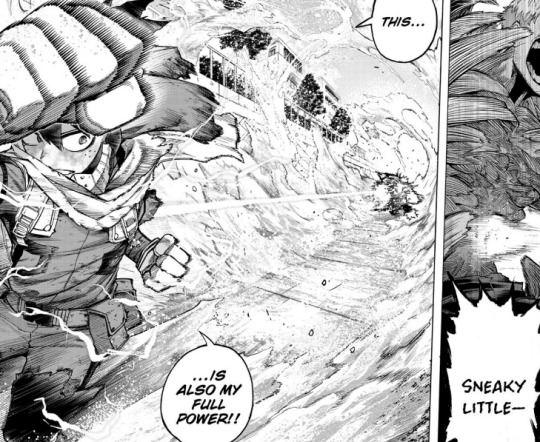
Well, if he’s failed in his goal of understanding a villain then does the story call him out on his failure? Does Deku face any sort of narrative consequence for that failure? Is he framed negatively for failing to understand Muscle, the same way that Judai is framed for abandoning Yubel? Nope. Deku doesn’t express any frustration at all over is inability to reason with Muscle. There’s also no negative consequence for Deku just choosing to punch muscle, it turns out that there was no reasoning with Muscle and some people are just bad eggs so Deku was right. It’s okay for characters to fail, but if a character fails and it’s not framed by the story as a failure then the writing itself as failed. Why even bother to include this scene in the first place if it doesn’t advance Deku’s character in any way? This scene in spite of showing Deku failing to understand someone actively paints Deku in a positive light, because of how much stronger he is ow that he can OHKO a guy that gave him trouble all the way back in the camp arc.
This scene doesn’t tell anything about Deku as a character, it just makes him look cool. In fact that’s precisely the problem, Deku isn’t adequately challenged as a character, because he’s never allowed to fail. Even when he does obviously fail at the things the narrative set out for him to do, he’s never challenged on those failures, because the priority isn’t to make Deku grow, it’s to make Deku look good. As I said before, Judai is the hero because he’s the weakest. Deku is the hero because he’s the strongest. Well, next a big flaw on Deku’s part is that he worshippd the same heroes that were making the world corrupt. Heroes like Endeavor who created people like Dabi. So, does Deku take action to either criticize the older generation of heroes, or separate himself from them in order to try to be better than them? Nope, he teams up with them. Not only that, Deku can’t do something as simple as tell Gran Torino out loud about his plans to save Shigaraki. If Deku feels that Shigaraki is worthy of salvation then he should at least try to make an argument here about his ideal of saving others.
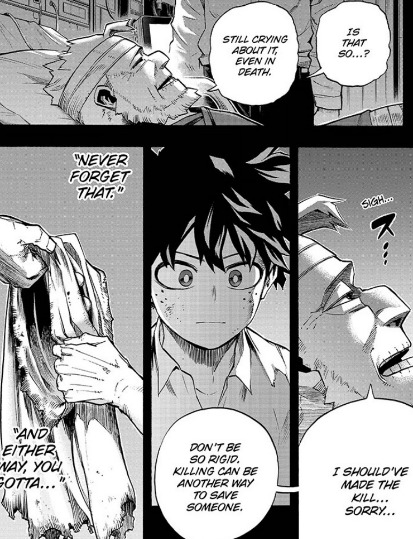
Now here’s the thing, if Deku hadn’t directly looked at the camera and told us he wanted to save Shgiaraki, would we be able to deduce his intentions from his actions? If you took away all of Deku’s internal monologue, and just showed him punching Muscular and saying nothing when Gran Torino says he may have no choice but to kill Shigaraki would anything about Deku’s actions indicate that he wants to save Shigaraki? Let me use avatar the last airbender as a positive example for a moment. People say that Aang’s desire to spare Ozai’s life comes out of left field, but like if you analyze Aang as a character down to their bending, and the way they react in situations they always prefer de-escalation, or taking a third option as opposed to confronting things head on. It’s literally why Toph says Aang has trouble learning earth bending, because as an airbender, he always tries to look for some other way to solve the problem, instead of a direct confrontation with force. As early as season one, Aang tells Zuko someone who has tried to kill him several times that he was friends with someone from the fire nation one hundred years ago and in a different situation they could be friends. Aang’s desire to save the Firelord may not have been told to us until the last possible minute, but Aang’s aversion to violence has always been a part of his character from the beginning. However, Deku never shows any similar aversion to violence. There’s basically no example where he ever tries to de-escalate a situation, or he avoids a conflict by seeking a third option.
Anyway, let’s move onto the next example. In the confrontation where Lady Nagant fights Deku, when Deku learns the fact that the heroes were employing government hitmen to attack people for uhh… exercising free speech does Deku give any reaction to this information? When Lady Nagant says that Deku is only going to bring back the status quo, does he show her any meaningful evidence that he won’t do that.
Deku’s response is because the world is so grey, he needs to extend a helping hand to others. Which you know what thay could be a response. Deku saying that his response to the corruption of the hero world is that he now understands that society led some people down the wrong path, so his way of addressing the wrongs of that society is lending a helping hand to as many people as possible even people he used to think was irredeemable.
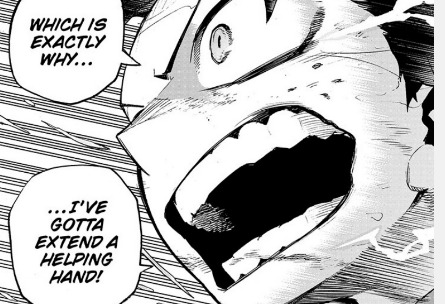
I will give Deku the benefit of the doubt, I think this is an acceptable answer. I can’t save everyone, but that’s not going to stop me from trying to save as many people as possible and maybe I can save people who were this society’s victims on the way too. However, does Deku demonstrate his resolve to extend a helping hand in any meaningful way.
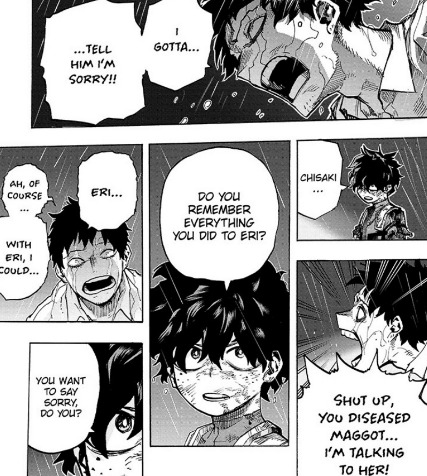
Deku is met with an armless, insane Overhaul who’s begging for someone to help heal his father figure in the Yakuza from his coma. This isn’t like Muscular who insists that there’s no helping him, Deku is met face by face with someone asking him for help. Deku’s gotta extend a helping arm whenever he can, because he knows some people were abandoned and led astray by this society… Unless that person is someone he doesn’t like personally. At which point he only helps them on a conditional basis. We are told Deku will save anyone and everyone, but Deku is met face to face with an armless man who is begging for help and Deku’s does nothing to help him. Deku’s not criticized for refusing to help overhaul either, it’s never brought up again. When Deku begins to experience a mental breakdown because of all the people he’s trying to help in the Dark Deku arc, we are told this is the result of Deku trying to save everyone, but we do not see Deku attempting to save a single villain after Muscular and Nagant.
He exhausts himself beating up villains that AFO sends after him, and only helping innocent civilians. Which would be fine if this arc were about how Deku is running away from his real responsibilities the same way that Judai was running, but that’s not what we’re being told. We are told that this is all part of an arc of Deku learning to understand villains and be a hero.
Deku is asked “Can you save Shigaraki?” by the story, but Deku never at any point has to deliberate on that question. Judai doesn’t deliberate on that question either, but him choosing not to think about things and stay ignorant is the point.
It’s actually fine to make Deku stagnate as a character. It’s fine to have him take the easy way out by just punching villains and giving up on them after one conversation. It’s fine for him to be empathetic to other people’s suffering, or even self-righteous. It’s fine for him to be ignorant.
He could be all of those things if it was a part of a narrative teaching him to unlearn his behavior. In fact the narrative might have been better if Deku started out by saying he didn’t want to save Shigaraki, that there was no choice but to kill him, because then at least his actions would be consistent with his words. Then his lack of empathy and his tendency to resort to violently beating up villains instead of avoiding violence would be character flaws he could work on. Deku however, is presented to us as this empathic hero who is always willing to give others a second chance though he never actually sticks his neck out in order to do so. Continuing on with our slow crawl through MHA, one of Deku’s friends is revealed as the traitor. Deku has a heartwarming scene fo saying that Aoyama can still be a hero, but look at his actions. He lets the adults in the room physically tie Aoyama in a straightjacket and imprison him, for the crime of… doing bad things while he was in a hostage situation. Apparently, if a bank teller helps the bank robber by giving them money when the robber has a gun to his head, the swat team should just snipe the bank teller. Not only does he not defend Aoyama against the adults, or stand up for him, or tell the adults they’re wrong to treat Aoyama a clear cut victim who had a gun to his head and was bing held hostage like he’s a villain - he also lets the adults use Aoyama an innocent victim as bait in order to lure out AFO. Deku tells Aoyama he can still be a hero, but he doesn’t defend Aoyama as a victim of being taken hostage, nor does he stop the adults from further taking advantage of him and throwing him right into danger. Some people are just led the wrong way that’s why they need to be extended a helping hand, but fuck Aoyama I guess. He needs to earn the right to be sympathized with by physically putting his life in danger.
Deku can’t even go out of his way to save a friend who he’s known for the better part of a year, when that friend is a complex victim forced to do bad things.
Then Deku and Uraraka have a conversation where they both, kind of ruminate on the idea that maybe the villains are human beings who are worthy of sympathy.
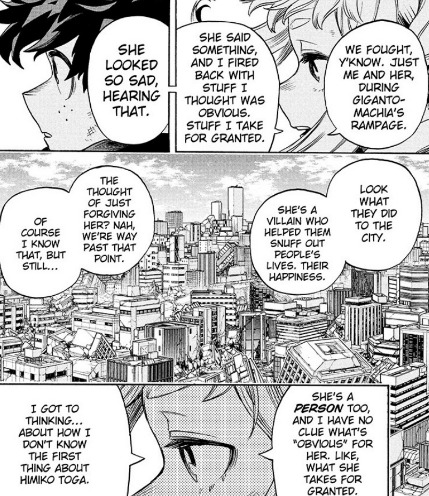
In fact Uraraka is actively trying to dehumanize Toga by looking at the destroyed city, so she won't have to think of Togaas a person.
The language here is also a major fault of this arc. It focuses far too hard on “forgiveness” over and over again. As I said before, saving Shigaraki isn’t about Shigaraki at all, it’s about Deku, and how he wants to use his power as a hero. Deku has even stated himself that he doesn’t believe that OFA is a power that should be used for killing people. So why does whether Toga or Shigaraki are forgivable or not even matter? It’s the same with Deku refusing Overhaul any sympathy. If he’s so morally opposed to abusers, then why does he work with Endeavor and defend him at every visible opportunity, even in front of his victims? Whether or not Deku can forgive Shigaraki doesn’t matter, because Deku is not the moral arbitrator or right and wrong. In fact Deku doesn’t even have any morals, so how is this a moral debate? Is there any point where Deku gives a clear definition of what he thinks right and wrong is? Does he quot Immanuel Kant to the audience?
Batman doesn’t kill people, not because he thinks that every last person on earth can be saved, but because Bruce Wayne an incredibly rich white man thinks that maybe he shouldn’t have the authority to decide who lives and who dies. When Bruce doesn’t kill the joker, it doesn’t mean he thinks the Jokers actions are forgivable, it’s because Bruce thinks it’s not his place to determine whether someone has the right to live.
The whole conflict that MHA presents us is that heroes pick and choose who to save, and only save the ones they deem as innocent. So, how does Deku saying repeatedly they can’t forgive Shigaraki contribute to that theme in any way? In fact by focusing on forgiveness, rather than whether or not he personally has the right to pick and choose who lives and who dies Deku is ignoring the elephant in the room. The question isn’t about whether Shigaraki’s redeemable or if his deeds should ever be forgiven. The question is whether Deku has the right to decide who gets saved and who doesn’t.
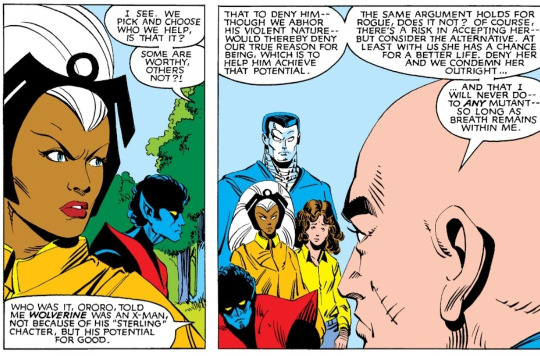
We are told that Deku as a character is someone who wants to save everyone no matter what, so Deku shouldn’t be focusing on whether or not Shigaraki is worthy of forgiveness, he should be making an idealistic argument like Xavier does in this panel. Why doesn’t Deku talk out loud with Uraraka on how he believes his power is for saving others, and not killing? If he’s meant to represent some idealistic hero, then why doesn’t he even talk about his ideals? Why don’t I as the reader know what those ideals are?
I think Xavier’s ideals of forcing the X-men to provide a good example to the mutant community, in order to try to earn the respect of other human beings is wrong, but at least he has ideals. He tries to inspire the other people around him to live up to those ideals. The story can criticize him for his ideals and point out how they’re wrong, while it can also uplift parts of his idelogy like where he believes there are no evil mutants. Deku has a chance to do the same to Uraraka, to tell her clearly, “I don’t think we as heroes have the right to pick and choose who we help…?” but he waffles. Not only does he waffle, but this moment is meant to be read as an indication that both Deku and Uraraka are sympathetic individuals who want to save their villains. They are supposed to look good and idealistic here and they don’t. For Deku it just seems like a repeat of his behavior with Overhaul. The only villains that are worthy of sympathy, are the ones that he personally decides are forgivable.
The story isn’t about whether or not it’s moral to save someone who’s killed as many as Shigaraki has. The story never seriously discusses any sort of complex morality or moral philosophy. Once again to bring up avatar, yes you can argue Aang sparing the life of a war crimminal is bad, but Aang mentions on multiple occasions that he wants to retain the cultural values of the airbending people. Aang has a morality, a consistent morality, it might not be a morality you personally agree with but at least he has one. Deku hates abusers, unless he’s next to Endeavor then he thinks abusers should be given the chance to atone. Deku doesn’t believe that One for All is a power for killing, but he never stands up to any of the adults who are blatantly trying to kill Shigaraki, he doesn’t even express out loud to Uraraka that he doesn’t think heroes have the right to decide who lives and who dies. In fact he’s given the perfect opportunity to, when Hawks kills a villain and it’s broadcast live on the news in font of everyone, but Deku never has anything to say about that. The reason Deku and Uraraka both put such an emphasis on “forgiving” their villains has nothing to do with the story itself. It’s because the author Horikoshi, is afraid that some people will misinterpret his story as saying that he actually thinks that saving a villain like Shigaraki means that he condones mass murder, so he has to have the characters talk about not forgiving Shigaraki.
Judai doesn’t have any consistent morals either, but once again that’s the point and something the story relentlessly calls him out on.
Cobra: Fortune would never smile on a fool like you who fights while prattling on about enjoying duels. Cobra: You are certainly a talented duelist. But you have one fatal flaw. Judai: A fatal flaw? Cobra: Yes, your duels are superficial. Someone who fights with nothing on his shoulders, cannot recover once he loses his enjoyment. What a duelist carries on his shoulders will become the power that supports him when he's up against the wall! Cobra: But you have nothing like that! Those who go through life without anything like that cannot possibly seize victory. Cobra: But I know that nothing I say will resonate with you... because you have nothing to lose but the match. Judai: I... Cobra: Afraid aren't you? Right now, you have nothing to support you.
Judai’s regularly called out for his superficiality. Judai is only a hero because he’s strong and wins fight, he doesn’t feel any responsibility towards other people, and in fact he loathes having to feel responsible for others. Judai isn’t just naive, he deliberately chooses to remain ignorant. Since he’s ignorant of his own faults, he makes awful decisions when it comes time for him to lead, and his friends die because of choices he made. We are told that Deku doesn’t want to remain ignorant, that he wants to understand villains, but Deku’s actual actions are him continuing to ignore society’s ills and the suffering of victims. In fact if you take away Deku’s internal monologue and the narration, Deku’s actions almost exactly mirror Judai’s.
Deku is just as superficial as Judai, and he also doesn't want to spend any time thinking about what kind of hero he wants to be, but the narrative never punishes him for it.
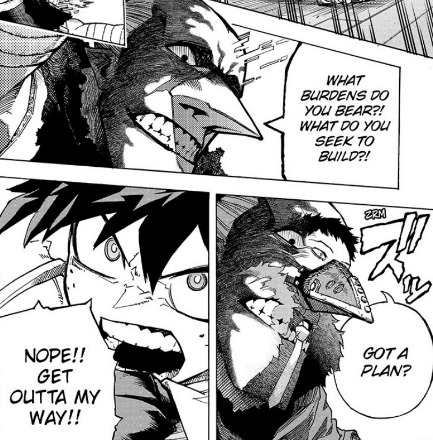
Judai is asked what burdens he has to bear and he has to meaningfull answer that question, Deku is allowed to get away with not having to think about anything. Deku remains superficial. Both Judai and Deku spend the entire arc running away from their villain rather than confronting them in any meaningful way. They both never express out loud any sympathy for their villain, or try to empathize. THey both never step down from the role of hero, and only confront their villain as a hero, because they don’t want to think about themselves as complicit or in the wrong. Shigaraki and Deku’s final confrontation mirrors Judai and Yubel’s but without the same clear framing. THe entire time Yubel is trying to get Judai to empathize with them, and Judai only responds with physical violence, because they don’t want to stop being the hero and because they can’t see Yubel as anything other than the villain. As soon as Deku arrives on the battlefield (by the way everyone else and their mom pointed this out, but Deku who doesn’t think OFA is a power for killing, is completely okay with a plan called the “Sky coffin plan” where every other hero was clearly trying to murder Shigaraki).
When Deku arrives he asks if Shigaraki is still in there, but he doesn’t do anything to try to reach Shigaraki, he jumps right to punching him. In fact he never tries anything besides punching him as hard as possible. How is punching Shigaraki with the force of a thousand suns saving him exactly? How is that different from how he tried to defeat Shigaraki the last war arc, before he saw the image of the crying child that made him want to try a different approach in saving Shigaraki? In Judai’s final fight with Yubel, it’s made explicitly clear that Judai is not trying to save Yubel, and that’s a fault on his part. In fact Judai gives the traditional “I have friends, and you don’t” speech to Yubel but it’s a subversion of how that speech is usually used. Usually that speech is used to show that the protagonist won because of they valued friendship,while the villain treated their friends poorly and only cared about power. However, it’s ironic in this case because Judai got all of his friends killed. Judai treats his friends like garbage. This speech isn’t used to show that Judai is winning because he values his friends more than Yubel does, it shows that Judai is a hypocrite, playing the hero in this situation where they are just as bad as Yubel. Judai’s not morally superior, he’s just lucky that he has good friends. Friends that were willing to save him. The only connection Yubel has to anyone else, Yubel’s only friend is Judai and Judai is a shit friend.
In fact, Mirio tries to give a version of the “You don’t have any friends” speech to Shigarkai, only for Shigaraki to get mad and tell Mirio that he does have friends and people he wants to protect.
This fact is also something that is blatantly ignored by Deku, even though Mirio tells him about it… even though we are told that Deku is trying his best to see the humanity in Shigaraki.
Judai blatantly admits they’re trying to kill Yubel. Which makes them a worse person, but a better character than Deku, because their actions are clearly framed by the narrative and consistent.
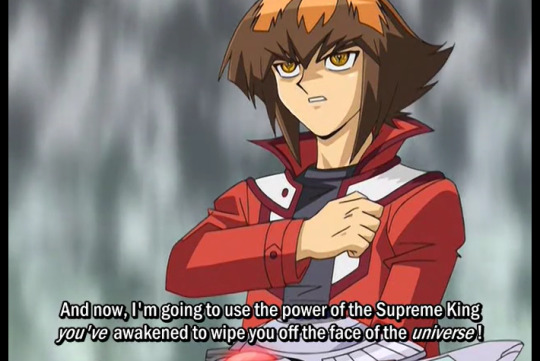
On the other hand we are told that Deku doesn’t want to kill Shigaraki, and yet everything Deku does makes it look like he’s just trying to kill Shigaraki and put him out of its misery. If we didn’t have Deku stating out loud that he wants to save Shigaraki and wants to see him as a human, there’d be nothing in his actions to indicate that he’s trying to avoid killing Shigaraki. Deku says he can’t pretend he didn’t see Shigaraki crying, but like, does he ever hesitate to punch Shigaraki, does he ever think that causing Shigaraki more harm is wrong when he’s already suffered so much? Deku says that Shigaraki is a person but does he treat him like a person? Does he try to talk to him like a person? To use avatar again, Aang does talk to Zuko pretty early on. Deku doesn’t even give the classic “We could have been friends under different circumstances” speech. When Shigaraki resists Deku’s attempts to see him as a person or emapthize with him, Deku’s response is to just resort to punching harder.
Which is in effect the same thing Judai does to Yubel, just kill them as a villain so they don’t hurt anybody else, but framed in an entirely different light. Judai is shown to be ruthless, and cold in his attempt to only settle the conflict with Yubel by violently putting them down. On the other hand we’re being told that Deku is compassionate and empathic while he punches Shigaraki with the force of a thousand suns.
There’s another eerie similarity between both of these final confrontations. At the climax of the confrontation, both Judai and Deku have a psychic vision where they see events from Yubel and Shigaraki’s childhood. This vision is supposed to help both characters understand the good in the villain they’re facing.
Let’s see the contents of this vision and how the visions change each character. Judai is shown a vision of his past life where Yubel sacrifices their entire body, and even their humanity to go through painful surgery to turn into an ugly dragon, all for the sake of protecting Judai in a previous life.
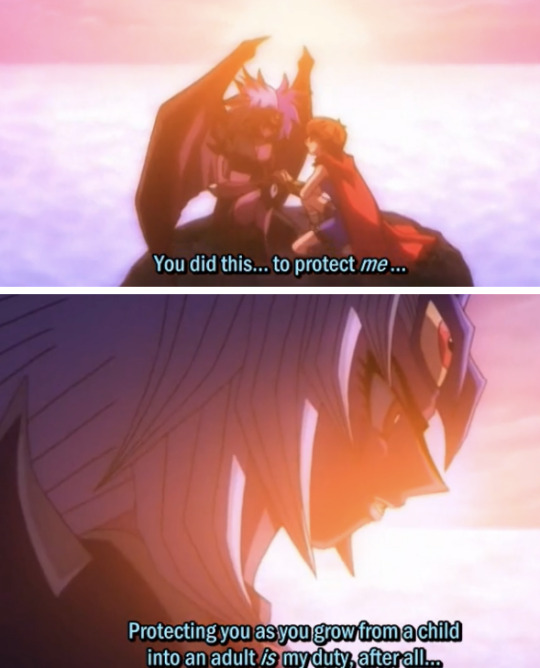
Judai is then forced to witness the good side of Yubel they’ve been ignoring all along to paint them as a villain. Yubel is simultaneously extremely selfish and willing to hurt people Judai cares about, but they’re also extremely selfless and will do anything to protect Judai and have made great sacrifices in the past for Judai’s sake. Deku gives lip service to not ignoring the humanity in Shigaraki, but Judai is literally forced to acknowledge the humanity in Yubel. Not only that, but Judai changes his behavior immediately after learning this new information. After seing the sacrifice that Yubel made for him in the past, Judai responds with a sacrifice of his own. A sacrifice that perfectly mirrors the sacrifice that Yubel once made for him. Yubel gave up their humanity for Judai, so Judai fuses his spirit to Yubel’s, becoming a human / spirit hybrid so Yubel no longer has to be alone.
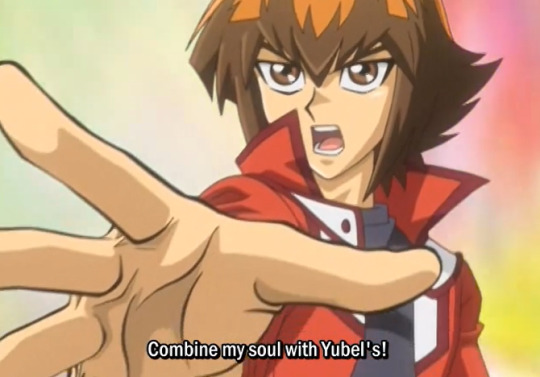
Judai also doesn’t just fuse their soul with Yubel’s in order to stop Yubel from destroying everything, it’s because both of them at this point need to atone together, and Judai is fulfilling his responsibility of watching over his friend until the end to prove that you care about them - as he said to Sho. Judai’s also fulfilling Johan’s dream of helping repair the bonds between spirits and humans, by reconciling with Yubel and repairing their bond. It’s also Judai atoning for his previous behavior of abandoning Yubel, by choosing to stay alongside them as they both atone together. Deku does sacrifice OFA during the fight against Shigaraki, but their sacrifice isn’t to help Shigaraki, but rather doing psychic damage to Shigaraki by using OFA is the only way to defeat them. He transfers OFA in order to break Shigaraki’s brain so he’ll stop reissting and Deku can beat him down. Judai fuses their soul together with Yubel out of empathy and a responsibility they feel to help their friend fater abandoning them, Deku transfers One for All to Shigaraki in order to hurt him and make him easier to punch. It's funny that Deku doesn't travel to Shigaraki's mind to learn more about him, but instead with the specific intent of harming him.
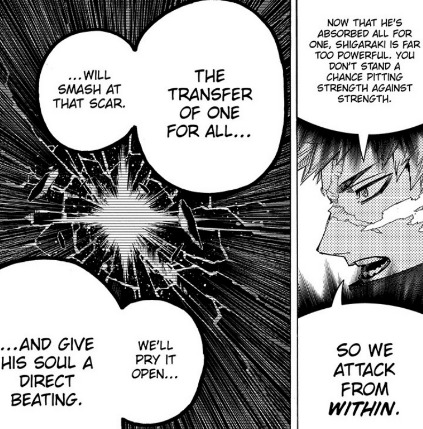
Once he's inside Shigaraki's mind, he doesn't take time to reflect on how Shigaraki used to stand up for bullied kids, or how he wants to be a hero to villains because no one else will stick up for the outcasts in society. No, he only care about Shigaraki when he takes the form of a child crying for help.
In the aftermath of the psychic vision Deku’s behavior doesn’t change towards Shigaraki in any way either. You could say he sacrificed his own arms in order to try to comfort Shigaraki within the depths of his own mind - but that’s not a real sacrifice either because his arms immediately come back. When Judai learns about the sacrifice that Yubel made in a previous life towards him, he stops seeing Yubel as an enemy and finds a way to resolve things peacefully between them. When Deku lanterns that Shigaraki’s a victim of All for One, and that his entire life was a lie, when he sees Shigaraki’s suffering first hand does his beavior twoards Shigaraki change in any way?
When he sees Afo has taken over Shigaraki’s body again, does he try to shout for Shigaraki, to tell Shigaraki to fight from the inside, to reassure Shigaraki that he’s still in there that there’s still good in him? Nope. He just punches Shigaraki some more.
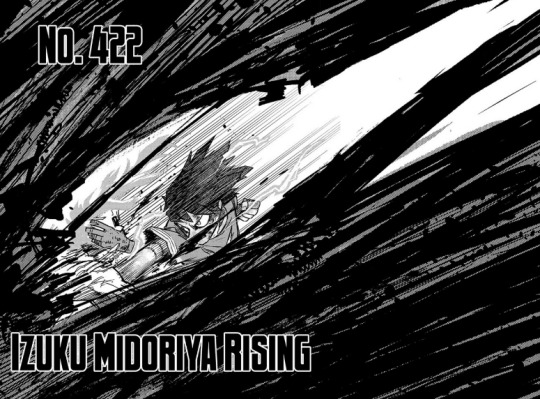
What Deku needed to tell Shigaraki is so obviously set up by the narrative too. Shigaraki wanted just one person in that house to tell him he could be a hero. Deku wanted his mother to tell him he could be a hero if he was quirkless. Deku sees that Shigaraki started out as a boy who wanted to be a hero, and who was manipulated into being a villain but does he try to appeal to the boy inside of Shigaraki by telling him he can still be a hero? Does he now see the good in Shigaraki? Nope, he just tries to kill him by punching him really hard.
I purposefully chose the images for the banner of this post, because it shows how differently MHA and GX treated its villains in the end. Yubel is embraced by Judai in the end, Shigaraki evaporates into dust.
"Judai, now that our souls have become one we will never be separated again. I have now been filled with your love and power. Let us fight together, against the wave of light leading this universe to destruction!"
Shigaraki could so easily have been given the love and empathy that Yubel was shown, but instead their life ends with no show of empathy from Deku, and with them dying believing that their long life of tragedy meant nothing in the end. Shigaraki realizes he's a crying kid, but he's never comforted.
Shigaraki: I only stole my body back from Master, and I didn't destroy anything. "In the end, I was just as you said... A crying kid, huh?"
Yubel is embraced and comforted, Shigaraki disintegrates into nothing.
One of these stories is apparently an optimistic story about heroes saving people, but it ends with the lifelong victim being killed in the most nihilistic manner possible, never receiving comfort, and never achieving anything with his long life.
The other story is a silly anime about card games, shows that when people are alone and suffering they can lash out and do terrible things. That all people are weak especially when they're alone, but the solution isn't to abandon them, or condemn them for their faults, but to believe in them and help uplift them the same way that Judai decides to uplift Yubel so they can atone together.
Which is why Deku gets an F in being a hero. Go directly to summer school. Do not pass Go. Do not collect $100.
#mha meta#ygo meta#mha 423#bnha 423#mha 423 spoilers#bnha 423 spoilers#izuku midoriya#deku#shigaraki tomura#tenko shimura#judai yuki#yubel#soulshipping#yu gi oh gx#yu gi oh
807 notes
·
View notes